
130 Excellent Economics Research Topics To Consider
Table of Contents
Are you an economics student searching for good topics for your research paper? If yes, then keep on reading this blog. To make the topic selection process easier for you, here we have suggested a list of the best economics research topics on various areas associated with the subject. In addition to that, we have also presented a brief overview of economics research paper topic selection and writing.
Quickly explore the entire list and choose any ideal topic for composing your economics thesis or dissertation.
Economics Research Paper Topic Selection and Writing
Have your professor asked you to submit an economics research paper? If yes, then topic selection is the first step you should do. In case, your supervisors had not suggested any research ideas, make sure to choose a unique economics research topic that you are interested in. The topic you choose should be understandable for you and your readers, and it should also have a wide research scope with the necessary information for crafting a comprehensive research paper or essay.
After you have selected a research topic for your economics assignment, sketch an outline with the research ideas that you have gathered. Then, with the help of the essay outline you have prepared, draft the research paper in a well-structured manner by including the essential elements such as the introduction, body, and conclusion.
The introduction paragraph of your research paper should have a catchy opening sentence, brief background information on the topic, and a strong thesis statement addressing the purpose of your research paper. After the introduction, in the body paragraphs, you should include innovative topic sentences and explain your arguments with supporting evidence in a way to persuade your reader. Then, you should finally close your research paper with an engaging conclusion that contains a brief summary of the main points.
List of the Best Economics Research Paper Topics
You may think that it is easy to choose a research topic for your economics research paper. But actually, it is not. As economics is a complex and broad subject, choosing a perfect research topic from it is a daunting task.
If you are asked to write an economics research paper or essay, then you can prefer to choose a topic from economics research areas such as macroeconomics, microeconomics, behavioral economics, agricultural economics, development economics, financial economics, and so on.
Here, we have sorted different categories of economics topics and have recommended a list of excellent economics research topic ideas for you to consider. Go through the entire list and pick a topic that is ideal for writing academic papers as per your instructor’s requirements.
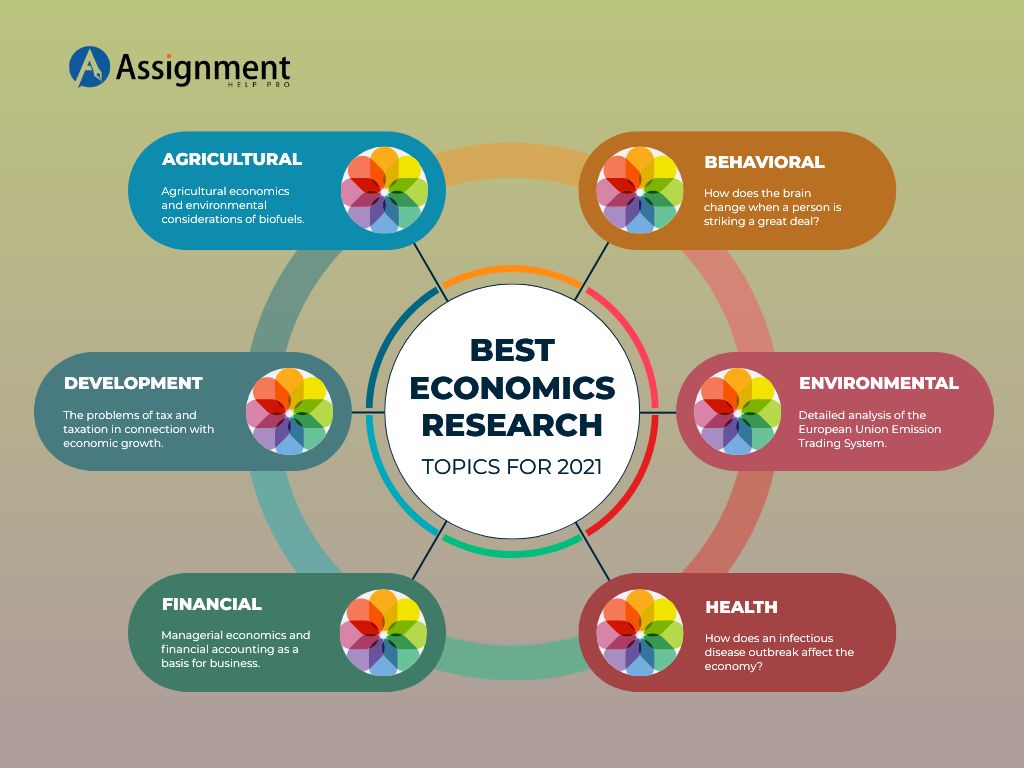
Agricultural Economics Research Topics
- Farmer’s contribution to agricultural social capital.
- Agricultural economics and agribusiness.
- An analysis of economic efficiency in agriculture.
- Agricultural and resource economics.
- Agricultural economics and environmental considerations of biofuels.
- Analysis of food security and poverty status among households in Ehime Mbano
- Role of bank loans and credit facility in financing Nigerian agriculture sector: a case study of Nigeria agricultural cooperative and rural development bank
- Evaluation of the impact of micro-finance banks on the South African agriculture sector
- How poultry farming is becoming a veritable tool for the economic empowerment of South Africa?
- Critical analysis of the problems and prospects of agriculture financing in rural India
Behavioral Economics Research Paper Topics
- What does the economy of trust mean?
- How does the brain change when a person is striking a great deal?
- The impact of economic stability on the social life of a person
- The buying capacity and gender
- How does race relate to economic power?
- Big data and its implications for behavioral economics
- The impact of behavioral finance on investment decisions.
- Cognitive and behavioral theories in economics.
- Behavior implications of wealth and inequality.
- Using behavioral economics to help in reducing substance abuse
Development Economics Research Topics
- The relation between development and incentive for migration.
- The economic consequences of population growth in developing countries.
- The determinants of high-performing institutions in emerging economies
- The impact of globalization on income distribution in emerging economies
- The problems of tax and taxation in connection with economic growth.
- The economic impact of terrorism on developing markets.
- Investigate the relationship between family planning, labor force, and income fluctuations.
- The impact of natural disasters on the economy and political stability of emerging markets.
- Budgeting and decision-making by low-income earners in emerging economics
- The impact of multinational commodity trading through the development of economic perspective.
- Compare and contrast the impact of demand-pull inflation and cost-push inflation on a country’s economy
- Discuss the impact of multinational commodity trading through the perspective of development economics
- Discuss the concepts of mercantilism, linear stages of growth model, economic nationalism, and structural-change theory
- Investigate the relationship between unemployment and fluctuations in national income
- Compare and contrast the economic patterns of villages across Papua New Guinea
Environmental Economics Research Paper Topics
- Explain the energy markets’ economic potential.
- How does global warming affect economic growth?
- How technological advancement leads to economic growth
- Evolution of economic institutions concerning climate change
- Cost-benefit analysis of the regulation of the environment
- The economic perspectives of the distribution of natural resources across boundaries
- The relationship between financial subsidies and the generation of eco-friendly products
- Detailed analysis of the European Union Emission Trading System
- Why it’s important to analyze the economics of clean drinking water
- How wildlife protection affects the economy
Read more: Outstanding Environmental Science Topics for You to Consider
Financial Economics Research Topics
- Risk-taking by mutual funds as a response to incentives.
- Financial economics for infrastructure and fiscal policy.
- Managerial economics and financial accounting as a basis for business
- The analysis of the global financial crisis of 2020
- Stock market overreaction.
Health Economics Research Ideas
- How do chronic diseases affect the workforce and the economy?
- How can public hospitals optimize their revenue collection?
- The economics of the pharmaceutical industry
- How an unhealthy country translates into a poor country
- Is the world’s hunger affected by economics?
- How does perfect competition work in the pharmaceutical world?
- How does an infectious disease outbreak affect the economy?
- Is health insurance important?
- How is the economy affected by a smoking ban?
Research Paper Topics on International Trade
- What are the gains and losses of international trade for developing countries?
- The importance of international trade in developing countries
- The relationship between economic growth and international trade
- The impact of Brexit on small and middle businesses in the UK
- To what extent does a currency union affect trade?
- The roles of exchange rate and exchange rate regime in the US export.
- To what extent are the gains of less developed countries from trade liberalization exaggerated?
- Foreign direct investment in the United States: Determinants and impact
- The relationship between foreign direct investment and wages
- The effects of the banana crisis on the Jamaican and British economies
Macroeconomics Research Topics
- Global recession and factors that contribute to it.
- The relationship between Internet connectivity and productivity in the workplace.
- The relationship between economic growth and unemployment in your country.
- Income Dynamics and demographic economics.
- What should our government do to minimize the risks of future default?
- The connection between politics and economics.
- The world problems through macroeconomic analysis .
- US Market Liquidity and Macroeconomics.
- The structure, history, and activities of the World Bank.
- Economics of education in developing markets.
- Public policies and socio-economic disparities.
- Banks and their role in the economy.
- Problems and possible solutions for Japan macroeconomics.
- State regulation of the economy in foreign countries: main models of regulation.
- The effect of currency devaluation on small and medium firms
- A comparison of the United States unemployment to the rest of the world
- The relationship between common stock prices and inflation in your country.
- Macroeconomics and self-correction of the economy.
- Analysis of Africa’s macroeconomics and its performance.
- The implications of Internet banking on bank profitability.
Read more: Best Macroeconomics Research Topics and Ideas for Students
Microeconomics Research Topics
- Explain how competition influences the price.
- Opportunity costs explained from a microeconomics perspective
- Inflation sources and consequences explained
- The impact of demonetization on small and medium businesses
- The connection between the minimum wage and market equilibrium.
- Perfect competition in microeconomics
- Theories in microeconomics
- The effect of labor force participation on the economy and budget
- Economic inequality as a result of globalization.
- Explain the balance between supply and demand in microeconomics
- Dynamics of the Gini index as a reflection of the problem of inequality in income
- Privatization of Public Enterprises and its implications on economic policy and development
- How does the stock market work?
- The impact of game theory on economic development.
- The changes in oil prices: causes and solutions.
- Marketing uses in microeconomics.
- The economic explanation of political dishonesty.
- How company mergers and dissolutions impact the economy
- The role of tax collection agencies in microeconomics
- Different microeconomic models and how they face the effect of industry conditions
A Few More Microeconomics Research Ideas
- How exactly does Uber fit into the economy of trust?
- How does a person’s brain alter when they hit a big deal?
- missing practical human insights from big data and how this affects the economy.
- explaining how supply and demand are balanced in microeconomics
- Changes in economic institutions with regard to climate change
- Effects of greenhouses on economic growth
- Effects of climate change on economic growth
- Analysis of the European Union Emission Trading System in great detail
- Is resource management for waste scarce? A microeconomics explanation of opportunity costs
- Effects of wildlife protection on the economy
Interesting Economics Research Topics
- What role does entrepreneurship play in economic development?
- How do automation and artificial intelligence affect the labor market?
- Discuss the Economics of healthcare systems and policies in developing countries.
- Explain the effects of trade agreements on income distribution.
- How does foreign aid affect economic development?
- Explain the impact of monetary policy on financial markets and inflation.
- Discuss the effects of income inequality on social mobility.
- How does tax reform impact business investment?
- Explain the role of microfinance in alleviating poverty.
- How does behavioral economics impact personal savings habits?
Final Words
From the list of economics research topics recommended in this blog, choose any topic of your choice and craft a top-quality research paper or essay. It is not necessary that you need to use the suggested topic as it is, you can also modify the research topic and write your academic paper. In case, you are unsure how to select the right topic and write a persuasive economics research paper, get in touch with us immediately.
We have a team of professional writers who are experts in the field of economics to assist you in drafting a plagiarism-free economics research paper on the best topics as per your requirements on time. Moreover, by taking our economics assignment help service online, you can also submit flawless and well-structured research papers deserving of an A+ grade.

Related Post

220 Amazing Religious Research Paper Topics and Ideas

Read and Understand How to Write a Research Proposal

100+ Controversial Research Topics and Ideas to Focus On
About author.
Jacob Smith
I am an Academic Writer and have affection to share my knowledge through posts’. I do not feel tiredness while research and analyzing the things. Sometime, I write down hundred of research topics as per the students requirements. I want to share solution oriented content to the students.
Leave a Reply Cancel reply
You must be logged in to post a comment.
- Featured Posts
140 Unique Geology Research Topics to Focus On
200+ outstanding world history topics and ideas 2023, 190 excellent ap research topics and ideas, 150+ trending group discussion topics and ideas, 170 funny speech topics to blow the minds of audience, who invented exams learn the history of examination, how to focus on reading 15 effective tips for better concentration, what is a rhetorical analysis essay and how to write it, primary school teacher in australia- eligibility, job role, career options, and salary, 4 steps to build a flawless business letter format, get help instantly.
Raise Your Grades with Assignment Help Pro
- Privacy Policy
Buy Me a Coffee

Home » 500+ Economics Research Topics
500+ Economics Research Topics

Economics is a vast and fascinating field that explores how individuals, businesses, and governments make decisions about the allocation of resources. As such, it provides a wealth of research opportunities for those interested in understanding and analyzing the complexities of modern society. From macroeconomic issues such as globalization and monetary policy, to microeconomic topics such as consumer behavior and market competition, there are numerous research topics that economists can investigate. In this post, we will explore some of the most interesting and relevant economics research topics that are shaping our world today.
Economics Research Topics
Economics Research Topics are as follows:
- The impact of technological change on income inequality.
- An analysis of the relationship between exchange rates and foreign direct investment.
- The effects of tax incentives on small business growth and development.
- The determinants of economic growth in developing countries.
- The impact of globalization on economic growth and development.
- An analysis of the effects of the minimum wage on employment and poverty.
- The role of central banks in managing inflation and economic stability.
- An investigation into the factors influencing consumer behavior and spending.
- An analysis of the impact of trade liberalization on economic growth.
- The effects of income inequality on social welfare and economic stability.
- The role of international trade in economic development.
- An investigation into the relationship between education and economic growth.
- An analysis of the effects of corruption on economic growth and development.
- The impact of the gig economy on employment and wages.
- An investigation into the causes and consequences of financial crises.
- The role of innovation in economic growth and development.
- An analysis of the impact of government spending on economic growth.
- The effects of globalization on the environment.
- The impact of climate change on economic growth and development.
- An investigation into the determinants of poverty and inequality.
- The role of entrepreneurship in economic growth and development.
- An analysis of the effects of monetary policy on economic growth and stability.
- The impact of immigration on labor markets and economic growth.
- An investigation into the factors influencing international trade flows.
- An analysis of the effects of foreign aid on economic development.
- The role of financial intermediaries in economic development.
- An investigation into the causes and consequences of income inequality.
- The impact of trade agreements on economic growth and development.
- An analysis of the effects of government regulation on business and economic growth.
- The role of technology transfer in economic development.
- An investigation into the effects of economic sanctions on trade and economic growth.
- The impact of population growth on economic development.
- An analysis of the effects of infrastructure investment on economic growth.
- The role of natural resources in economic development.
- An investigation into the effects of labor market policies on economic growth and employment.
- The impact of financial innovation on economic growth and stability.
- An analysis of the effects of income tax policy on economic growth and income distribution.
- The role of social capital in economic development.
- An investigation into the impact of economic policies on international trade.
- The effects of financial liberalization on economic growth and stability.
- The impact of urbanization on economic development.
- An analysis of the effects of international migration on labor markets and economic growth.
- The role of institutions in economic development.
- An investigation into the effects of exchange rate volatility on international trade.
- The impact of demographic change on economic growth and development.
- An analysis of the effects of government debt on economic growth and stability.
- The role of foreign investment in economic development.
- An investigation into the effects of labor market flexibility on economic growth and employment.
- The impact of intellectual property rights on innovation and economic growth.
- An analysis of the effects of economic inequality on social mobility and economic growth.
- The impact of COVID-19 on the global economy.
- The role of financial markets in economic growth.
- The effectiveness of monetary policy in stabilizing the economy.
- The relationship between income inequality and economic growth.
- The impact of government regulations on business activity.
- The role of technology in shaping the future of the economy.
- The effect of globalization on the labor market.
- The impact of trade policy on economic growth.
- The relationship between education and economic growth.
- The effectiveness of fiscal policy in stimulating economic growth.
- The impact of immigration on the labor market.
- The effect of tax policy on economic growth.
- The role of entrepreneurship in economic development.
- The impact of environmental regulations on economic growth.
- The effect of international capital flows on the economy.
- The relationship between innovation and economic growth.
- The impact of demographic changes on the economy.
- The role of infrastructure investment in economic growth.
- The effect of monetary policy on income inequality.
- The impact of government debt on economic growth.
- The relationship between corruption and economic growth.
- The effect of globalization on income inequality.
- The impact of education on income inequality.
- The role of social welfare programs in reducing poverty.
- The effect of minimum wage laws on the labor market.
- The impact of health care policy on economic growth.
- The relationship between energy prices and economic growth.
- The effect of government subsidies on business activity.
- The impact of exchange rate fluctuations on trade.
- The role of financial innovation in economic development.
- The effect of social media on consumer behavior.
- The impact of consumer confidence on economic growth.
- The relationship between economic growth and political stability.
- The effect of demographic changes on income inequality.
- The impact of government spending on economic growth.
- The role of labor unions in the labor market.
- The effect of natural disasters on the economy.
- The relationship between economic growth and environmental sustainability.
- The effect of corporate social responsibility on business activity.
- The impact of intellectual property rights on innovation.
- The effect of cultural differences on business activity.
- The impact of financial crises on the economy.
- The relationship between economic growth and health outcomes.
- The effect of government corruption on economic growth.
- The impact of demographic changes on the labor market.
- The effect of foreign aid on economic growth.
- The impact of technological change on the labor market.
- The effect of monetary policy on income distribution.
- The impact of trade agreements on economic growth
- The effect of corruption on economic development
- The relationship between financial development and economic growth
- The impact of foreign aid on economic growth in developing countries
- The role of innovation in promoting economic growth
- The impact of globalization on income inequality
- The relationship between inflation and economic growth
- The role of natural resources in economic development
- The impact of government expenditure on economic growth
- The relationship between income distribution and economic growth
- The impact of monetary policy on economic growth
- The role of education in promoting economic growth
- The impact of entrepreneurship on economic development
- The relationship between taxation and economic growth
- The impact of infrastructure on economic growth
- The role of international trade in economic development
- The impact of fiscal policy on economic growth
- The relationship between financial liberalization and economic growth
- The impact of economic integration on economic growth
- The role of institutions in promoting economic development
- The impact of foreign direct investment on economic growth
- The relationship between inequality and economic growth
- The impact of social welfare programs on economic growth
- The role of technology in promoting economic growth
- The impact of political instability on economic growth
- The relationship between corruption and economic growth
- The impact of labor market policies on economic growth
- The role of human capital in promoting economic development
- The impact of health care on economic growth
- The relationship between exchange rates and economic growth
- The impact of foreign trade on income distribution
- The role of entrepreneurship in economic development
- The impact of environmental policies on economic growth
- The relationship between foreign aid and poverty reduction
- The impact of financial sector reforms on economic growth
- The role of social capital in promoting economic development
- The impact of regional integration on economic growth
- The relationship between public investment and economic growth
- The impact of monetary policy on income distribution
- The role of international migration in economic development
- The impact of labor market flexibility on economic growth
- The relationship between trade and technology transfer
- The impact of institutional quality on economic growth
- The role of financial sector development in promoting economic growth
- The impact of regional inequality on economic growth
- The relationship between education and poverty reduction
- The impact of foreign debt on economic growth
- The role of social protection in promoting economic development
- The impact of energy policies on economic growth
- The relationship between foreign trade and environmental sustainability
- The impact of international trade on income inequality.
- The relationship between public debt and economic growth.
- The effect of tax policy on international capital flows.
- The impact of government subsidies on technological innovation.
- The role of financial development in reducing poverty.
- The effect of regulation on market structure.
- The impact of globalization on financial stability.
- The relationship between financial development and income inequality.
- The effect of fiscal policy on long-term economic growth.
- The impact of financial frictions on business cycles.
- The role of international capital flows in financial crises.
- The effect of natural resource abundance on economic growth.
- The impact of fiscal decentralization on economic growth.
- The relationship between institutions and economic growth.
- The effect of financial innovation on market efficiency.
- The impact of international migration on the labor market.
- The role of corporate governance in firm performance.
- The effect of monetary policy on the housing market.
- The impact of environmental policy on the energy sector.
- The effect of competition policy on market outcomes.
- The impact of technology adoption on productivity.
- The effect of regulation on consumer welfare.
- The impact of trade policy on export performance.
- The relationship between social capital and economic growth.
- The effect of labor market institutions on the gender wage gap.
- The impact of financial liberalization on economic growth.
- The role of human capital in technological innovation.
- The effect of trade openness on innovation.
- The impact of natural disasters on economic growth.
- The relationship between inequality and economic growth.
- The effect of exchange rate volatility on international trade.
- The impact of banking regulation on financial stability.
- The role of venture capital in financing innovation.
- The effect of regional trade agreements on economic growth.
- The impact of financial development on economic growth in emerging markets.
- The relationship between government spending and economic growth.
- The effect of monetary policy on credit markets.
- The impact of innovation on firm performance.
- The role of social networks in job search and labor market outcomes.
- The effect of international capital flows on income inequality.
- The impact of natural resource dependence on political instability.
- The relationship between financial development and income mobility.
- The effect of tax competition on fiscal policy.
- The impact of labor market institutions on unemployment.
- The role of infrastructure investment in economic development.
- The effect of monetary policy on financial market volatility.
- The impact of fiscal policy on income redistribution.
- The role of digital currencies in the future of finance.
- The effects of the gig economy on labor markets.
- The impact of artificial intelligence on economic growth.
- The relationship between climate change and economic growth.
- The role of blockchain technology in supply chain management.
- The effects of automation on the labor market.
- The impact of E-commerce on traditional retail industries.
- The relationship between social media and consumer behavior.
- The role of data analytics in business decision-making.
- The effects of globalization on income inequality.
- The impact of digital platforms on the sharing economy.
- The relationship between education and economic growth in the digital age.
- The role of fintech in financial inclusion.
- The effects of trade policies on global supply chains.
- The impact of corporate social responsibility on business performance.
- The relationship between immigration and economic growth.
- The role of venture capital in stimulating innovation and economic growth.
- The effects of the circular economy on sustainable development.
- The impact of cybersecurity threats on the global economy.
- The relationship between gender inequality and economic growth.
- The role of green finance in promoting sustainable development.
- The effects of automation on income inequality.
- The impact of the sharing economy on traditional business models.
- The relationship between human capital and economic growth.
- The role of technology transfer in international trade.
- The effects of regulatory frameworks on innovation.
- The impact of government policies on the growth of start-up companies.
- The role of venture philanthropy in social entrepreneurship.
- The effects of digital disruption on the financial services industry.
- The impact of the circular economy on job creation.
- The relationship between health outcomes and economic growth.
- The role of impact investing in social and environmental sustainability.
- The effects of trade agreements on the global economy.
- The impact of entrepreneurship on economic growth.
- The relationship between innovation and income inequality.
- The role of corporate governance in sustainable business practices.
- The effects of immigration policies on labor market outcomes.
- The impact of international capital flows on economic development.
- The relationship between corporate social responsibility and financial performance.
- The role of innovation clusters in regional economic development.
- The effects of digitalization on productivity.
- The impact of the sharing economy on urban development.
- The relationship between social entrepreneurship and economic growth.
- The role of government policies in promoting sustainable development.
- The effects of demographic changes on the economy.
- The impact of digitalization on economic development in developing countries.
- The relationship between consumer behavior and sustainability.
- The role of private equity in stimulating economic growth.
- The impact of government spending on economic growth
- The effects of minimum wage laws on employment and poverty rates
- The role of government subsidies in promoting renewable energy adoption
- The impact of trade liberalization on economic growth and income inequality
- The effectiveness of monetary policy in managing inflation and unemployment
- The determinants of foreign direct investment flows in emerging markets
- The role of financial markets in economic development
- The impact of globalization on the labor market
- The effects of tax policies on economic growth and income distribution
- The role of human capital in economic growth and development
- The economics of climate change and the environment
- The effects of population aging on economic growth and social welfare
- The impact of social safety net programs on poverty reduction
- The effects of corruption on economic development and political stability
- The impact of technological innovation on labor market outcomes
- The economics of healthcare policy and healthcare markets
- The determinants of entrepreneurship and small business success
- The effects of income inequality on economic growth and social welfare
- The economics of urbanization and regional development
- The role of foreign aid in promoting economic development
- The impact of fiscal policy on economic growth and government debt
- The effects of financial regulation on economic stability and growth
- The economics of education policy and school choice
- The determinants of consumer behavior and market outcomes
- The role of multinational corporations in the global economy
- The effects of immigration on labor markets and economic growth
- The impact of monetary policy on financial markets and stability
- The economics of natural resource management and conservation
- The determinants of industrial competitiveness and productivity
- The effects of trade policies on economic growth and regional integration
- The role of institutional quality in economic development
- The impact of technological change on income inequality
- The economics of innovation and intellectual property rights
- The effects of financial globalization on emerging markets
- The role of infrastructure investment in promoting economic development
- The impact of exchange rate policies on international trade and investment
- The determinants of consumer credit and debt behavior
- The effects of social media and online platforms on market competition
- The role of international organizations in global economic governance
- The impact of natural disasters on economic development and poverty
- The economics of gender inequality and discrimination
- The effects of government regulation on business behavior and market outcomes
- The role of behavioral economics in understanding market behavior
- The impact of public investment on economic growth and social welfare
- The determinants of household saving and investment behavior
- The economics of renewable energy and clean technology adoption
- The effects of economic sanctions on international trade and investment
- The role of information and communication technologies in economic development
- The impact of globalization on income distribution and poverty
- The economics of international migration and remittances.
- The effects of income inequality on economic development
- An analysis of the efficiency of market structures in different industries
- The role of technology in economic growth and development
- The impact of international trade on economic development
- An investigation into the determinants of inflation
- The effects of labor market regulations on employment and productivity
- An analysis of the relationship between economic growth and environmental sustainability
- The role of institutions in economic development
- The impact of foreign aid on economic development
- The effects of taxation on economic growth
- An investigation into the factors that contribute to economic fluctuations
- The effects of globalization on income distribution
- The impact of education on economic growth and development
- The role of infrastructure in economic development
- The effects of trade liberalization on economic growth
- An analysis of the impact of exchange rates on trade and investment
- The relationship between innovation and economic growth
- The impact of government policies on the agricultural sector
- The effects of corruption on economic development
- An investigation into the effects of demographic changes on economic growth
- The impact of financial crisis on economic growth
- The effects of foreign direct investment on economic growth
- An analysis of the effects of natural resources on economic development
- The impact of healthcare on economic growth
- The effects of international migration on the economy
- The relationship between poverty and economic development
- The role of infrastructure in promoting economic growth
- An investigation into the effects of regional economic integration
- The impact of foreign trade on economic development
- The effects of government regulation on economic growth
- An analysis of the role of technology in improving economic efficiency
- The impact of population growth on economic development
- The effects of government spending on income inequality
- The role of the financial system in economic growth
- The impact of energy policies on economic development
- An investigation into the effects of intellectual property rights on economic growth
- The effects of trade on labor markets
- The role of social capital in economic development
- The effects of regional inequality on economic development
- An analysis of the impact of financial market development on economic growth
- The impact of international trade on technological progress
- The effects of financial regulation on economic growth
- The role of institutions in promoting entrepreneurship
- The impact of healthcare policies on economic growth
- An investigation into the effects of income redistribution on economic growth.
About the author
Muhammad Hassan
Researcher, Academic Writer, Web developer
You may also like

200+ Funny Research Topics

500+ Sports Research Topics

300+ American History Research Paper Topics

500+ Cyber Security Research Topics

500+ Environmental Research Topics

500+ Physics Research Topics
Department of Economics
Faculty research questions.
Topics of research arranged by field and faculty member.
Econometrics
- Can Bayesian methods lead to improved analysis of economic data?
- How should we model dynamic economic decisions?
- How can we measure the factors that contribute to human capital development?
- How can we deal with the errors in measurement that pervade social science data?
- How can we confidently estimate models when there are some assumptions we aren’t sure of?
Experimental and Economic Theory
- Why do voters vote against their best interests?
- Under what circumstances do globalization and trade increase conflict?
- What determines the quality of public officials?
- How can choice models incorporate psychological biases?
- How to design modes of interaction to guarantee good outcomes?
- What does fairness mean?
- What are the effects of private information on bargaining outsomes?
- How can third parties help to improve bargaining outcomes?
- What are the effects of reputation in different market settings?
- Under what circumstances does egalitarian redistribution efforts make all current members of a society better off?
- Why are so many Americans in prison?
- What is the combined effect of segregation in social networks, peer effects, and the relative size of a historically disadvantaged group on the incentives to invest in human capital?
- How does having access to more informative signals affect strategic interactions in a game theoretic setting?
- How should we disclose information in a market in which consumers have to search for the products they wish to consume?
- What are the dynamics of employer-employee contracts when they are able to learn from past actions and outcomes?
- How does knowing the wages of your peers affect the way you bargin with your employer?
- How do we design economic markets when individuals don't have access to all the information they need to make informed decisions?
- What is the role of the on-demand economy and internet labor markets in closing the gender wage gap?
- What can account for cooperation and trust?
- How important are they to effective institutions and development?
- How does the unfolding of world history since the first transitions to agriculture contribute to an explanation of cross-country differences in comparative economic development?
- What are the market consequences when consumers have limited ability to find the best deals?
- How do past experiences change one’s risk tolerance?
- What do people consider fair for others?
- How do you measure the riskiness of an investment?
- How does the bargaining process change when you move from two players to more than two?
- What is the fair distribution of the surplus generated by the team when there are externalities across members of the team?
- Under what circumstances do coalitions (cartels, lobbies, unions) form?
- How does the farsightedness of players affect the stability of cooperative outcomes?
- What are the welfare implications of non-paternalistic externalities?
Applied Microeconomics
- When women’s wages rise, does domestic violence fall?
- What are the true costs of teen motherhood?
- Is cash welfare like insurance?
- How can we make machine intelligence work for humanity?
- How should societies manage dominant networks?
- 2 billion people lack bank accounts. Can mobile phones allow them to access credit?
- Can hospital desegregation in the American South during the 1960s explain the narrowing of the black-white test score gap in the 1980s; the racial convergence in college enrollment rates in the early 1990s; and the fall in the black-white earnings gap from the late 1990s to the early 2000s?
- What effects did Medicare’s rollout after 1965 have on older-age health and life expectancy? How large were the associated costs? How did provider behavior and costs change after the Prospective Payment System (PPS) was instituted in 1983? What is the evidence on the relative costs and benefits of single-payer versus private insurance systems?
- How did black Americans in the South fare during and after Reconstruction? Did former slaves form networks after the Civil War, and what role did the black church play? Did networks play a role in the size and destinations of the Great Migration of African-Americans to the North?
- How effective are policies of voluntary compliance in environmental regulation?
- Why does female education in developing countries increase growth?
- Does technological progress increase the returns to schooling in a developing economy?
- How can we improve economic opportunity for children from poor backgrounds?
- How do taxes affect individuals and the economy?
- Which policies can improve the quality of education, and how can we allow access to high quality education for all students?
- How do votes respond to government propaganda and censorship?
- How has the Common Application changed college admissions in the United States?
- Why is infant mortality higher in the US than Europe?
- Does disease cause vaccination?
- Do IT centers foster school enrollment in developing countries?
- Does life expectancy affect human capital investments?
- What is driving rising political polarization?
- How does competition for advertising affect media content?
- How does SNAP affect household behavior?
- Could access to modern contraceptives help Zambian women graduate from college?
- Is India's flagship anti-poverty program causing kids to drop out of school?
- How do water outages affect health and economic activity in urban Africa?
- How can we improve the design of social programs, such as public housing, to increase welfare?
- What factors influence individuals' decisions about how much to work and where to work, especially given the rise of alternative/flexible work arrangements?
- How do decision makers' behavioral biases evolve over time?
- Do denser cities mean less driving?
- Does public transit increase economic activity? Does it relieve congestion?
- What factors have shaped urban growth in China?
Macroeconomics
- How does international trade in intermediate inputs of production affect the aggregate productivity of the economy?
- How does a currency devaluation affect consumer prices?
- What is the effect of wealth inequality on the productivity of the economy?
- What was the source of the Great Depression and the Great Recession?
- How should governments respond to financial panics?
- What is the effect of conventional and unconventional monetary policy?
- How should fiscal policy be used to stabilize the business cycle?
- How does income inequality affect investment in human capital and growth?
- What explains the historical transition from stagnation to growth? What roles did educational, institutional, geographical and cultural factors play in the transition?
- What role did declining fertility and population growth play in promoting economic growth?
- What causes fluctuations in unemployment?
- Should unemployment insurance be more generous in recessions?
- How should government spending respond to economic fluctuations?
- How should monetary policy respond to fluctuations in unemployment?
- What are the economic origins and consequences of group formation and ethnic diversity?
- What are the historical roots of African development?
- What can we learn from the nation's oral traditions?
- What is the effect of health on economic growth?
- What is the role of geography in explaining relative economic development?
- Can we measure economic growth from outer space? Evidence from satellite images
- What are the consequences of legal origins for the legal and regulatory framework of the society, as well as for economic outcomes?
- What is the role of institutions and human capital in development?
- What is the role of errors in expectations in asset pricing?
The Best Ways to Find Economics Research Topics
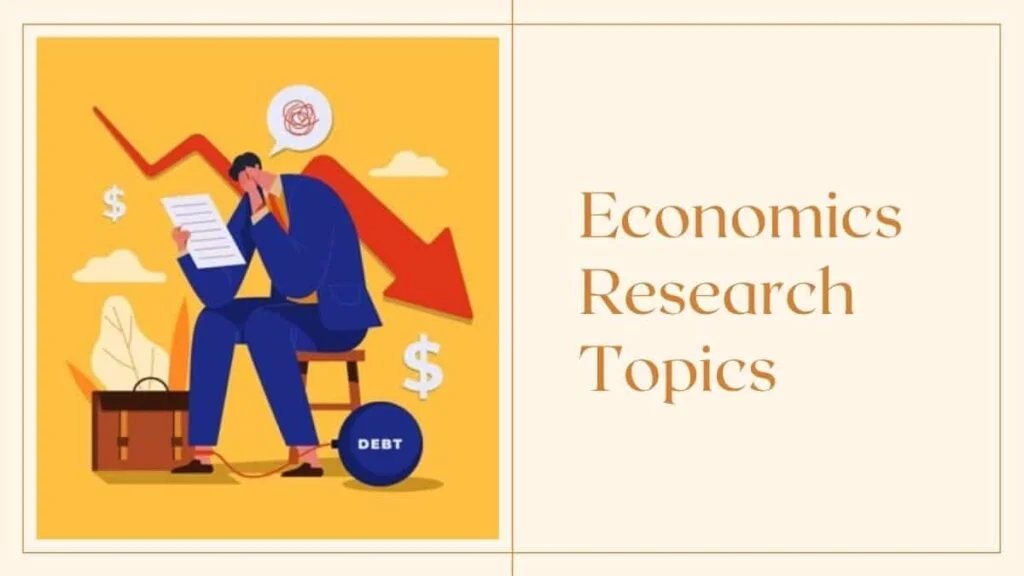
Economics may not always seem easy to all, especially when it is time to choose right economics research topics for a project or writing a master’s thesis. Many diverse aspects have to be taken into consideration while choosing the topic. And yes, sometimes it does get confusing. That is the reason why we are here to help you.
This blog is authored with a view to assist students get through the tough process of choosing the right topic for their economics research.
What is the concept of economics research topics?
Table of Contents
Economics can be defined as a social branch of knowledge. Its study mainly examines the use of scarce natural resources. These resources are used in the process of production, distribution and consumption of goods and services, which are produced in an economy during a particular period of time. This process is continuous.
Before assigning the research papers, students are taught of many elements that affect the economy. This qualifies them to learn real-life economies, day-to-day expenditures as well as expenses. Such basics include elements like medicine, politics, trade, unemployment, poverty, religion, and war with others. Based on these learning’s, they tend to choose economics research topics depending on their area of study.
Tips on how to choose economics research topics
One of the biggest and challenging tasks is to come up with that first lengthy economics research paper. However, in order to name that task, an economics research topic is a must. Picking the best economics research topics is an issue most learners pursuing economics studies come across. Sometimes, learners face difficulties understanding different characteristics of economics research. This is what makes choosing the right and best fitting economics research topics difficult.
Thus, to help the students, this section of the blog contains tips on how to choose the right economics research topics.
Generate interest
Yes! This tip is very important. The topic you choose for the project should absolutely interest you and generate the hunger of curiosity inside you. If the research paper requires you to be working on it for months or even longer. Then it has to be something by which you are thoroughly attracted to. The best way to keep you engaged is to position a question for your paper to which you have always wanted to know the answer. Consider what intriguing economic issues you enjoy discussing or even for a fact, thinking about.
Take inspiration
If one is uncertain where to start from, or have no idea as to what sort of project would be matching up to your course, then it is a wonderful idea to have a look at previous students’ projects. You can grasp inspiration, as a student. Most universities/schools allow its students to access the previous year’s student’s research materials and papers. However, while doing the same, one must make sure to never copy someone else’s idea. You may only look up to them for taking references from their work.
Ask for advice
Once you have collected ideas on the topic for your project, you will perhaps want to ask people who have a certain amount of experience for advice. This tip should be considered before you start your work on the paper. The experienced person or the supervisor should advise you whether the topic chosen by you is the right one. Some basic preparation before the meeting should be done.
Make sure you understand the basic facts of the research area properly. Also, the sub questions and what methods you will be using should be clear for the supervisor to understand. This advice should cover for the rest of the research paper as well. He/she must be able to guide you and correct you wherever necessary.
- How to write essay on Economics
- What is economics and why it is important
- How to get an A+ grade in economics homework
Specific topic
This amazingly useful tip while drafting your research paper advises us to think smaller. If the person is not much acquainted with the economic topic, then it is obvious for that person to not include all the subtleties and complexities it comprises. Be more specific while writing. This will help your project to not only be more manageable, but also that you will actually get to the root of researching for something.
Interdisciplinary topic
If you are in the field of economics but find yourself more absorbed in another academic subject, this may be a golden opportunity to study about that particular field in detail as a part of your research paper. For instance, you could pick a topic which traces itself in a subject like history, sociology, finance, politics, or even psychology. The advantage here is that you can try out acknowledging other information and approaches from another field of study.
It will help you to curate a different project in comparison to most of your fellow classmates as well. This is because they will tend to study a topic which is based purely in the field of economics. It may seem a little harder to acquire information about a different field all together, but we are certain that it will all be worth it at the end of your economics research paper.
Conclusion on how to choose economics research topics
From the above discussion, we are clear about the concept and how to choose economics research topics. With the help of the above mentioned tips, one can now easily pick the right and an equally appropriate topic for their economics research paper.
Economics is the study of how humans utilize scarce resources in the production of goods. Students analyze how these goods and services are eventually distributed globally after production. Because of the vast field, they sometimes find it difficult to find suitable economics research topics. and also get the best economics assignments from our economics assignment helper .
Frequently Asked Questions (FAQ’s)
What is the concept of economics.
Economics is a social branch of knowledge. It determines how rare natural resources are allotted for the purpose of production, distribution and consumption of goods that are produced in a country within a stipulated period of time.
Why is it difficult for students to choose suitable economics research topics for their papers?
Owing to the vast as well as complex sea of knowledge in the field of economics, it sometimes becomes difficult for students pursuing economics studies to choose the right economic research topic for their papers.
What are the tips mentioned in order to choose the right economic research topics?
Tips mentioned in the blog above are all very useful. Generating interest and curiosity among the writer, taking inspiration from students, taking advice from supervisors are some of the tips mentioned above.
Related Posts

7+ Tips On How To Get Higher Grades In Exams In 2023
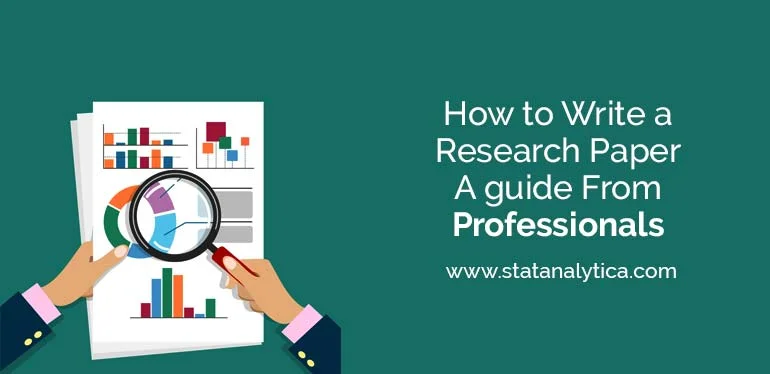
How to Write a Research Paper- A guide From Professionals
- Research Paper Guides
- Research Paper Topics
Economics Research Paper Topics: 300+ Ideas for Students
- Speech Topics
- Basics of Essay Writing
- Essay Topics
- Other Essays
- Main Academic Essays
- Basics of Research Paper Writing
- Miscellaneous
- Chicago/ Turabian
- Data & Statistics
- Methodology
- Admission Writing Tips
- Admission Advice
- Other Guides
- Student Life
- Studying Tips
- Understanding Plagiarism
- Academic Writing Tips
- Basics of Dissertation & Thesis Writing
- Essay Guides
- Formatting Guides
- Basics of Research Process
- Admission Guides
- Dissertation & Thesis Guides

Table of contents
Use our free Readability checker
Welcome to our latest blog post on economics research topics! Whether you are an academic seeking inspiration or a student looking for a starting point for your next assignment, you've come to the right place.
With so many areas to explore in economics, it can be difficult to know where to begin. But don't worry, we've got your back. In this post, our online paper writers have shared some of the most interesting and hot economics research paper topics. So, grab a cup of coffee and let's dive in!
What Are Economics Research Topics?
Economics is a social science that studies how people, businesses, and governments make decisions about how to use resources. It deals with issues like production, distribution, and consumption of goods and services.
As a student, you might be given to write a research paper on research topics in economics. These types of social science topics can cover a wide range of subjects, including:
- Macroeconomics
- Microeconomics
- International economics
- Behavioral economics, and more.
Whether you are interested in exploring current trends, global markets or history, or taxes, we collected a bunch of economics topics for a research paper to choose from. Stay with our service to spot the best idea for your upcoming project.
Characteristics of Good Economics Research Paper Topics
When it comes to selecting a research topic related to economics, it is important to decide on a subject that is not only interesting but also appropriate for your academic level. Consider these fundamental characteristics of good economics paper topics to make a wise choice:
- Select a title that is both relevant and is intended to solve a current issue.
- Choose a unique topic that has not been explored too much by other researchers.
- Make sure you can easily access the data or sources needed to create your paper.
- Consider if the topic has the potential to be of practical or social importance.
- Pick an area that genuinely interests you and will keep you motivated throughout your project.
How to Choose an Economics Research Paper Topic?
Choosing between this selection of economics project ideas can be really difficult especially if you are first to this. However, with a little bit of guidance, you will see that there is nothing challenging about picking a proper topic for a research paper in economics. Take a look at these step-by-step instructions to make the right decision:
- Brainstorm potential economics research topics that sound interesting to you in the first place. After all, you don’t want to work with boring aspects.
- Narrow your list down and consider whether there are enough resources to back up your research.
- Carry out preliminary investigation to see what you can write about. Use academic journals, newspapers, and other reputable sources to gather information.
- Check if the topic complies with your instructor’s guidelines.
- Based on your research and requirements alter a title to create a focused research question.
Remember to choose a topic that you are passionate about and that aligns with your academic and professional goals.
Economics Research Topics List
Economics is a vast field that encompasses a wide range of topics and issues. If you're looking for inspiration for your next research paper, consider exploring one of these top research paper topics in economics:
- What is the impact of trade policies on international trade patterns?
- How does income inequality affect economic growth?
- What role does entrepreneurship play in economic development?
- How do government regulations affect market efficiency?
- What are the economic implications of climate change and environmental policy?
- How do automation and artificial intelligence affect the labor market?
- What are the effects of healthcare policies on the economy and society?
- How does education influence economic outcomes?
- What are some economic aspects of taxation and fiscal policy?
- How does globalization impact domestic economies and societies?
Interesting Research Topics in Economics
Are you searching for interesting topics in economics? Look no further than these cptivting economic paper topics ideas.
- How do government policies impact income mobility?
- What role do financial institutions play in economic growth?
- Economics of housing and homelessness.
- How do immigration policies shape the labor market?
- Impact of gender inequality on economic growth.
- Sustainable development and renewable energy.
- What are some effects of globalization on income distribution?
- How do minimum wage policies impact employment and poverty?
- Economics of crime and punishment.
- How does corruption relate to economic growth?
- Effects of social welfare policies on income inequality.
- Healthcare markets and insurance systems.
- How does technology influence income distribution and employment?
- Education financing and student loan debt.
- How do economic sanctions affect international trade and diplomacy?
Good Topics for Economic Research Papers
Economics research topics are diverse and can be approached from various angles. Below are some great economic topics to write about:
- What are some effects of social media on consumer behavior and advertising?
- What is the relationship between corporate social responsibility and profitability?
- Sharing economy and its impact on traditional industries.
- How does climate change affect the tourism industry economically?
- Economics of healthcare systems and policies in developing countries.
- How does population aging influence labor markets and retirement policies?
- How does artificial intelligence impact business and employment?
- What factors are involved in energy transition and the shift to renewable energy?
- Income inequality and political polarization.
- How do digital streaming services and the music industry intersect economically?
- How does cultural diversity contribute to growth and innovation?
- Effects of trade agreements on income distribution.
- Cryptocurrency and blockchain technology.
- How does globalization impact labor standards and working conditions?
- Natural disasters and economic growth.
Best Economics Research Topics
Want to take your project to the next level? Don’t skip these hot economic research questions. They suit any academic level and can be supported by credible evidence.
- Big data and its role in economic forecasting.
- How does public debt impact economic growth?
- The economics of international migration.
- What is the impact of technological innovation on income inequality?
- The role of infrastructure investment in fostering economic growth.
- The economics of the gig economy and freelance work.
- How does foreign aid affect economic development?
- The economics of natural resource management and sustainability.
- What is the impact of urbanization on economic growth and development?
- The economics of the entertainment industry and streaming services.
- How do exchange rate fluctuations influence trade and investment?
- The economics of food production and distribution systems.
- How do government regulations affect small businesses economically?
- The study of behavioral finance and decision-making in economics.
- What is the impact of monetary policy on financial markets and inflation?
Unique Economics Research Topics
Economics is a constantly evolving field that offers endless possibilities for research and analysis. That’s why choosing unique economic research ideas shouldn’t be a big deal. Below we added a list of authentic topics you most likely won’t be able to find anywhere else.
- How does mobile banking contribute to financial inclusion in emerging economies?
- How do natural disasters affect supply chains?
- What are some effects of gender bias in venture capital funding decisions?
- How does population density influence the demand for public transportation in urban areas?
- Virtual currencies and their potential as an alternative to traditional currencies.
- How do government subsidies influence the adoption of renewable energy?
- How do industrial policies shape innovation and contribute to economic growth?
- Alternative meat and its potential impact on the food industry.
- What is the relationship between public transit availability and property values in urban areas?
- How does corruption impact economic growth and development?
- Renewable energy storage systems and their impact on grid stability.
- What are some effects of automation on job displacement and income inequality?
- Blockchain technology in the banking industry and financial transactions.
- International trade in cultural goods and services.
- How does income inequality relate to health outcomes from an economic standpoint?
Popular Economics Topics for Research Paper
Do you want to focus on current and pressing issues? Consider these trending topics for economic research papers.
- The impact of COVID-19 on the global economy.
- What are economic implications of healthcare reform?
- How does globalization affect labor markets economically?
- Climate change and the role of carbon pricing.
- Effects of income inequality on social mobility.
- How does automation impact employment and wages in the workforce?
- The economics of education and the burden of student loan debt.
- How do government regulations influence business and innovation economically?
- Income taxation and progressive taxation.
- Impact of immigration on labor markets.
- Behavioral economics and the use of nudges in decision-making.
- How do trade policies influence international relations and diplomacy?
- Mergers and acquisitions in the business world.
- How do minimum wage policies affect low-wage workers economically?
- Urbanization and transportation planning.
Economics Research Paper Topics for Students
As a student, picking decent economic topics for research papers can be a challenging task. It's important to focus on relevant and interesting aspects. Below you will find some economic research paper topics specifically geared toward students of all levels.
Economics Research Topics for College Students
College students majoring in economics have a range of choices when it comes to research topics. Below are some inspiring economic paper topics you can use as inspiration for your project in college:
- Effects of gig economy on labor markets.
- Economic growth and environmental sustainability.
- Impact of sharing economy on traditional industries.
- Housing affordability and homelessness.
- How does trade liberalization affect domestic industries and consumers?
- How does public policy influence small business growth?
- Food waste and its impact on sustainability.
- Income inequality and access to education.
- Impact of automation on the future of work.
- Online advertising and consumer behavior.
- How does fiscal policy influence income distribution and poverty reduction?
- How does tax reform impact business investment?
- Economics of international tourism and its impact on local economies.
- Effects of financial regulation on consumer behavior and investor confidence.
- Demographic shifts and labor force participation.
Economics Research Topics for Undergraduates
Are you an undergraduate student looking for topics related to economics? Here are some amazing ideas you can pick from:
- Financial implications of space exploration and commercial space travel.
- Role of urban farming in city development for sustainability.
- Impact of genetic engineering and biotechnology on the agricultural sector.
- Financial consequences of digital privacy.
- Implications of mass surveillance on consumer spending patterns.
- How do remittances influence growth in developing countries?
- Fiscal consequences of cybercrime and cybersecurity breaches.
- Role of microfinance in alleviating poverty.
- Potential financial implications of quantum computing.
- Water scarcity and its worldwide financial implications.
- Monetary consequences of epidemics, pandemics, and public health crises.
- Transformation of markets by virtual and augmented reality.
- Effect of corporate governance on shareholder value.
- Financial aspects of aging societies and pension reform.
- Role of intellectual property rights in promoting innovation and growth.
Economics Research Topics for Grad Students
Graduate students in economics are expected to delve deeper into economic theories, models, and concepts. They are also required to contribute new insights to the field. We suggest that you choose these economics topics for research to earn a high grade:
- How does drug legalization influence national economies?
- Impact of universal basic income on poverty levels and unemployment rates.
- Financial implications of political instability and conflict.
- Impact of cultural heritage sites on local and national finances.
- Financial repercussions of biodiversity loss and species extinction.
- Role of venture capital in fostering startups and growth.
- Disaster risk management and its relevance to financial resilience.
- Potential fiscal impacts of deep-sea mining.
- Financial consequences of single-use plastics and transition to a circular economy.
- Business aspects of the digital gaming industry and eSports.
- Impact of the maker movement and DIY culture on traditional manufacturing.
- How can nanotechnology shape future market economies?
- Impact of drone technology on supply chain operations.
- Financial aspects of mental health in the workplace.
- Role of public-private partnerships in fostering growth and infrastructure development.
Research Topics in Economics by Subject
Economics paper topics ideas will also depend on your area of expertise. This block will offer topics by subject, so that you can choose a theme that fits your special needs. Whether you are interested in exploring the economics of renewable energy or the effects of globalization on income distribution,you will surely spot an idea or two right below.
World Economics Research Paper Topics
The global economy is a complex and interconnected system, and there are many world economics research paper topics that can shed light on global aspects. Between them are these ideas:
- Evolving landscape of international trade in the post-COVID era.
- Role of Special Economic Zones in boosting global competitiveness.
- Impact of machine learning and artificial intelligence on global financial markets.
- How do social impact bonds contribute to global development goals?
- Cybersecurity risks in global financial institutions: Are we prepared?
- Influence of social entrepreneurship on worldwide poverty reduction.
- Green bonds and their role in global sustainable finance.
- Economic prospects of the African Continental Free Trade Area.
- Role of global remittance flows in socioeconomic development.
- Impact of climate change on global supply chains: What can we do?
- Global consequences of a cashless society: Are we ready?
- How does geopolitics affect global energy markets?
- Repercussions of cryptocurrency adoption on global financial stability.
- Economies of scale in global manufacturing: A new era?
- Role of international development assistance in achieving Sustainable Development Goals.
>> More ideas: Politics Research Topics
Microeconomics Research Paper Topics
Microeconomics studies the behavior of individuals and firms in making decisions regarding the allocation of resources. If you need microeconomics topics for research paper, we collected great ideas below:
- How do consumer ethics shape purchasing decisions?
- What influences price elasticity of demand in luxury goods markets?
- How does the gig economy affect individual financial stability?
- What are the key economic factors determining college major choices?
- How do credit scores influence personal finance management?
- What impacts have peer-to-peer lending platforms had on traditional banking?
- What drives consumer decisions between online and brick-and-mortar shopping?
- How do economic considerations play into personal retirement planning?
- What market dynamics and pricing strategies dominate the smartphone industry?
- How does behavioral economics impact personal savings habits?
- How significantly does brand loyalty influence consumer spending?
- What strategies help businesses survive during economic downturns?
- How does corporate social responsibility influence consumer choice?
- What role does digital marketing play in shaping consumer behavior?
- What are some economic impacts of identity theft on individuals and businesses?
Macroeconomics Research Paper Topics
Unlike microeconomics, macroeconomics explores the behavior and performance of entire economies. Below are some awesome macroeconomics research paper topics:
- Exploring connections between inflation and unemployment.
- Impact of quantitative easing on long-term economic growth.
- How does fiscal deficit affect a country's economic stability?
- The role of central banks in managing economic downturns.
- Effects of government debt on interest rates and investment.
- What factors contribute to business cycles and economic fluctuations?
- Examination of macroeconomic factors influencing foreign direct investment.
- How do monetary policies impact inflation and unemployment rates?
- Role of technology advancements in macroeconomic productivity.
- Impact of demographic changes on long-term economic growth.
- Can green investment stimulate economic recovery?
- What role do exchange rates play in a country's trade balance?
- Comparative analysis of economic growth models.
- Macroeconomic challenges of transitioning to a low-carbon economy.
- How does income inequality affect economic growth at a macro level?
Economics Research Paper Topics on International Trade
International trade is a vital part of the global economy and has a significant impact on development, and international relations. Here are unique topics for an economic research paper focusing on international trade:
- Impact of Brexit on international trade relations.
- How do currency fluctuations affect international trade?
- Economic consequences of trade wars: A case study of U.S.-China relations.
- Role of World Trade Organization in shaping international trade norms.
- How does international trade contribute to economic growth?
- Evaluation of free trade agreements and their economic implications.
- Role of emerging markets in shaping the future of international trade.
- How do trade barriers influence domestic industries?
- Fair trade vs. free trade: An economic analysis.
- Global supply chain disruptions: Lessons from the COVID-19 pandemic.
- Effects of international trade on income distribution within countries.
- Economic impact of sanctions on international trade.
- How do intellectual property rights issues affect international trade?
- Role of e-commerce in transforming international trade.
- What are the economic consequences of offshore outsourcing on international trade?
Financial Economics Research Topics
Financial economics is a subfield of economics that focuses on financial markets, institutions, and instruments. Here are outstanding financial economic topics for a paper:
- Role of FinTech in shaping the future of banking.
- Analysis of risk management strategies in investment banking.
- How do hedge funds contribute to financial market stability?
- Impact of regulatory changes on financial market competitiveness.
- How does financial literacy influence individual investment decisions?
- Examination of financial derivatives and their role in financial risk management.
- Role of central banks in maintaining financial stability.
- Analysis of market efficiency in cryptocurrency markets.
- How do financial crises affect economies in the long term?
- Financial inclusion and the role of mobile banking.
- Impact of corporate governance on financial performance.
- Examination of the link between financial markets and economic growth.
- High-frequency trading: Impact on financial market stability.
- Effect of algorithmic trading on financial market efficiency.
- How do interest rate changes impact financial markets.
Development Economics Research Topics
Development economics studies the economic and social development of low-income countries. With this branch in mind, we prepared a list of development economic research paper topics ideas:
- Role of microfinance in economic empowerment in developing countries.
- How do infrastructure projects affect economic development?
- How do cultural factors shape economic progress in developing countries?
- Impact of corruption on resource allocation in developing nations.
- Impact of foreign aid on economic growth in recipient countries.
- Evaluation of agricultural policies on rural development.
- How do commodity price fluctuations affect developing economies?
- Implications of population growth on resource management in emerging economies.
- How does political stability influence economic growth in developing countries?
- Impact of public health initiatives on economic development.
- Analysis of sustainable development strategies in emerging economies.
- How do migration patterns affect economic development?
- How does technological adoption improve productivity in developing economies?
- Role of social entrepreneurship in sustainable economic development.
- How does tourism influence the economic development of low-income countries?
Behavioral Economics Research Paper Topics
Behavioral economics combines insights from psychology and economics to understand how people make financial decisions. Below you can find behavioral economics research topics:
- Impact of cognitive biases on economic decision making.
- Role of emotions in consumer purchasing behavior.
- How does social influence shape spending habits?
- What are the economic implications of procrastination?
- Nudging for good: Can behavioral economics promote healthier lifestyles?
- How does framing influence consumers' perception of price and value?
- Role of incentives in shaping individual and collective behavior.
- Examination of loss aversion in investment decisions.
- Analysis of irrational behaviors in financial markets.
- Behavioral economics in policy design: What works and why?
- How does choice overload affect consumer decision making?
- The effect of anchoring bias in pricing strategies.
- Role of behavioral economics in promoting sustainable consumption.
- How does scarcity mindset affect economic decisions?
- Behavioral economics and personal finance: How to avoid common pitfalls?
>> Read more: Psychology Topics to Research
Environmental Economics Research Topics
Environmental economics investigates the interaction between economic systems and the natural environment. This subfield also offers multiple perspectives for exploration. Here are some examples of project topics on economics with emphasis on environment:
- Examining the economic impacts of biodiversity loss.
- Impact of environmental policies on manufacturing industries.
- Role of renewable energy investments in economic growth.
- Does a carbon tax impact economic competitiveness?
- Economic analysis of water resource management.
- How do natural disasters affect economic performance?
- The economic value of ecosystem services.
- Cost-effectiveness of different strategies for reducing greenhouse gas emissions.
- Role of environmental economics in climate change mitigation.
- How does waste management contribute to sustainable economic growth?
- The effects of air pollution on economic productivity.
- What is the economic impact of deforestation?
- Evaluation of economic tools for managing plastic waste.
- Economics of transitioning to a circular economy.
- How does sustainable agriculture contribute to economic development?
>> View more: Environmental Research Topics
Health Economics Research Topics
Health economics examines how health care practices affect the health outcomes of individuals and whole populations. Take a glance at these health economics research paper topics:
- Economic impact of pandemics on healthcare systems.
- Role of telemedicine in healthcare cost reduction.
- How do health insurance policies influence medical spending?
- Economic analysis of mental health issues and treatment access.
- The cost-effectiveness of preventative healthcare measures.
- Evaluating the economic burden of chronic diseases.
- Economic implications of antibiotic resistance.
- How does socioeconomic status influence health outcomes?
- Impact of aging populations on healthcare costs.
- Evaluation of the economic benefits of vaccination programs.
- The effect of medical technology advancements on healthcare costs.
- Role of behavioral economics in health promotion and disease prevention.
- How does health literacy influence healthcare utilization and costs?
- Economic analysis of substance abuse treatment.
- Evaluating the economic impacts of health policy reforms.
>> Read more: Public Health Topics for Research
Extra Research Topics for Economics
Sometimes, finding the right idea can be a challenging task. However, there are numerous resources available to help you find unique angles. Also, don't be afraid to ask your professors or research paper writer team for suggestions on the selection process. But if you don’t have enough time, we gathered some supplementary economics research topics.
Economics Essay Topics
An economics essay can cover a broad range of topics, from macroeconomic issues such as international trade and monetary policy to microeconomic aspects such as consumer behavior and market structure.
- Can an increase in minimum wage curb poverty?
- What are the potential economic effects of Brexit?
- Impact of income inequality on societal cohesion.
- How does the rise of remote work influence economic structures?
- Examination of the economic benefits of public libraries.
- Role of the informal economy in urban development.
- Economic implications of increasing life expectancy.
- How does piracy impact the music and film industry economically?
- Impact of subsidies on agricultural economies.
- Exploration of the economic factors influencing the housing market.
- Analysis of the economic costs of obesity.
- Role of child labor in global supply chains.
- Examination of the economic implications of internet censorship.
- Impact of single-use plastics on local and global economies.
- Economic effects of urban green spaces.
Economics Topics for a Short Project
If you need to complete a short assignment, you may want to consider project topics in economics that can be analyzed within a limited timeframe. Don’t worry. We’ve added some simple ideas as well:
- Examining the economic impacts of online privacy breaches.
- Role of advertising in shaping consumer behavior.
- Analysis of the economic effects of natural disasters.
- Economic implications of self-driving cars.
- Role of cooperatives in the economy.
- Impact of e-waste on developing economies.
- The role of micro-credit in alleviating poverty.
- Examining the economic impacts of space exploration.
- How do online reviews influence consumer purchasing decisions?
- Economics of disaster recovery: Case studies.
- Examination of the economic implications of cybercrime.
- Impact of nutritional labeling on consumer behavior and market outcomes.
- Economic analysis of the craft beer industry.
- Examining the economic effects of animal agriculture.
- How do tax incentives influence corporate behavior and economic outcomes?
Economics Research Questions
Formulating a research question is a crucial step in conducting an economics research project. A good research question should be specific, measurable, and relevant to the topic under study. Here are some economics research questions to consider:
- How does widespread adoption of digital currencies impact traditional banking?
- To what extent do economic factors contribute to obesity rates?
- What are the consequences of large-scale solar power adoption?
- How do parental leave policies shape labor markets?
- What impacts do large-scale data breaches have on corporations?
- Does green urban planning significantly contribute to city development?
- How much does mental health contribute to workplace productivity?
- What effects do fair trade agreements have on farmers in low-income countries?
- How valuable are clean oceans for global trade?
- How does political stability of a country influence foreign investments?
- What are the consequences of patent wars in the tech industry?
- How does the rise of freelancing shape labor laws?
- What economic implications does the rise of eSports have?
- How does nutrition education impact economic health?
- What are some benefits and drawbacks of commercial space tourism?
Economics Research Topics for Exams
If you're preparing for an exam, it's important to have a good understanding of the concepts and theories that you'll be tested on. To help you prepare, we offer these economics research topics for exams to study:
- Implications of autonomous vehicles on transportation.
- Role of trade unions in contemporary job markets.
- Analysis of gender disparities in retirement savings.
- Influence of corporate social responsibility on brand reputation.
- How do plant-based diets influence the global meat industry.
- Evaluating efficiency of ride-sharing platforms.
- Role of drones in shaping future commercial landscapes.
- How public health initiatives influence workplace productivity.
- Exploring the potential economic impact of asteroid mining.
- How does fashion industry affect global economy and environmental sustainability?
- Impact of video-on-demand services on traditional film industries.
- Role of social entrepreneurship in poverty alleviation.
- Role of energy-efficient appliances in electricity markets.
- Influence of shifting demographics on global trends.
- How does celebrity endorsement influence consumer buying behavior?
Economics Research Paper Topics for Experts
For those who are already experts in the field of economics, finding 100% original economics research topics can be an uphill struggle. But not with ideas attached below:
- How does quantum computing pose an economic challenge to cybersecurity firms?
- How do gene editing technologies affect agricultural markets?
- In what ways does space commercialization affect global economies?
- How does increased lifespan influence retirement and pension systems?
- Financial viability of carbon capture and storage.
- Influence of ethical consumerism on global supply chains.
- How have nanotechnologies impacted manufacturing sectors?
- Impact of rising sea levels on coastal economies.
- Role of predictive analytics in preventing financial fraud.
- Examining the economic consequences of major oil spills.
- How does deep face technology pose an economic challenge to film industries?
- Economic impacts of large-scale reforestation.
- Implications of extensive antibiotic resistance.
- Impacts of geopolitical tensions on global oil prices.
- Universal basic income as a solution for automation-induced job loss.
Bottom Line on Economics Papers Topics
Hopefully, by now you have found a perfect economics research paper topic. Make sure you can find enough evidence to back up your points. But if you have any difficulties with the research or writing process, consider to buy coursework or any other project from academic experts.
Look no further! Let our experts handle all the hard work for you. Say ‘ write my term paper for me ’ and forget about stress and tight deadlines. Get top-quality, custom-written papers tailored to your requirements.

Joe Eckel is an expert on Dissertations writing. He makes sure that each student gets precious insights on composing A-grade academic writing.
You may also like

Economic Theory Research Paper Topics

This page provides a comprehensive guide to economic theory research paper topics , aimed at students studying economics. The keyphrase for this page is “economic theory research paper topics”. The page offers 10 categories with 10 topics in each, expert advice on choosing and writing a research paper, and an overview of iResearchNet’s custom writing services for students.
Economic Theory Research Guide
Economics is a vast and complex subject that requires a lot of effort and critical thinking to master. The field of economic theory is particularly important for students of economics, as it provides the foundation for understanding the broader field of economics. Economic theory is a set of principles and concepts that explain how economies work and how people make decisions in the context of limited resources. Economic theory is a critical subject for students who wish to pursue a career in economics, as it helps them to understand the underlying principles of economic behavior.
Academic Writing, Editing, Proofreading, And Problem Solving Services
Get 10% off with 24start discount code.
In this guide, we will explore economic theory research paper topics, which are of great importance for students of economics. The primary objective of this guide is to provide a comprehensive list of research paper topics that students can use as a starting point for their research. This guide will be particularly helpful for students who are struggling to find a suitable topic for their research paper.
The guide will be divided into several sections, each of which will explore a different category of economic theory research paper topics. The first section will provide an overview of economic theory and its importance in the field of economics. The second section will provide a list of research paper topics related to microeconomics, which is the study of the behavior of individual agents such as households and firms. The third section will focus on macroeconomics, which is the study of the behavior of the economy as a whole. The fourth section will explore econometrics, which is the application of statistical and mathematical methods to economic data. The fifth section will provide a list of research paper topics related to international economics, which is the study of the economic interactions between countries. The sixth section will explore behavioral economics, which is the study of how people make decisions in the context of limited resources. The seventh section will focus on game theory, which is the study of strategic decision-making. The eighth section will provide a list of research paper topics related to development economics, which is the study of how economies can be developed to promote growth and reduce poverty. The ninth section will explore financial economics, which is the study of how financial markets and institutions function. The tenth section will focus on industrial organization, which is the study of how firms interact with each other and with consumers in different market structures.
In the following sections, we will provide a detailed discussion of each category of economic theory research paper topics, along with a list of 10 potential research paper topics in each category. This guide will be particularly helpful for students who are struggling to find a suitable topic for their research paper.
100 Economic Theory Research Paper Topics
Economic theory research paper topics cover a wide range of areas in the field of economics, from classical theories to modern and emerging ones. Research papers in economic theory require students to delve deep into the theoretical concepts and their applications in the real world. To make this task easier, we have categorized economic theory research paper topics into ten distinct categories. Each category represents a different area of economic theory, with specific topics that students can choose from to write their research papers.
Classical Economics
Classical economics is a school of thought that emerged in the 18th century and lasted until the mid-19th century. The classical economists believed that the market economy was self-regulating and that the government should not interfere with it. The main ideas of classical economics were developed by Adam Smith, David Ricardo, and John Stuart Mill. This section will provide a list of 10 potential research paper topics related to classical economics.
- The ideas of Adam Smith and their impact on modern economics
- The theory of comparative advantage developed by David Ricardo
- The labor theory of value and its relevance in modern economics
- The concept of the invisible hand and its role in the market economy
- The influence of classical economics on the development of capitalism
- The impact of technological progress on classical economics
- The impact of classical economics on contemporary economic policy
- The role of government in classical economics
- The relevance of the Say’s Law in modern economics
- The classical economists and the debate on the role of money in the economy
Neoclassical Economics
Neoclassical economics is an approach that developed in the late 19th century and was prominent during the 20th century. It is based on the belief that the market is the most efficient allocator of resources and that individuals act rationally to maximize their own utility. Some potential research paper topics in neoclassical economics include:
- The concept of consumer surplus and its relevance in modern economic analysis
- Analysis of the factors that influence supply and demand curves in neoclassical economics
- The role of neoclassical economics in shaping public policy towards free trade
- An analysis of market efficiency and its implications in neoclassical economics
- The role of neoclassical economics in shaping public policy towards environmental conservation
- The impact of neoclassical economics on modern macroeconomic theory
- The importance of price discrimination in neoclassical economics
- The role of information asymmetry in neoclassical economics and its impact on market efficiency
- An analysis of the role of neoclassical economics in shaping monetary policy
- The relationship between neoclassical economics and international trade theory
Keynesian Economics
Keynesian economics is an economic theory developed by John Maynard Keynes in the 1930s. This theory focuses on the role of government intervention in the economy to address issues of unemployment and economic growth. Research topics in Keynesian economics may include government policies to address economic recessions, the effectiveness of fiscal stimulus packages, and the impact of monetary policies on aggregate demand. Here are ten potential research paper topics in Keynesian economics:
- The role of government in reducing income inequality using Keynesian economics
- Comparing the effectiveness of fiscal and monetary policies in stabilizing the economy
- Keynesian economics versus supply-side economics: a comparative analysis
- The Keynesian multiplier effect and its impact on economic growth
- The role of government spending in stimulating economic growth during times of recession
- The impact of trade policy on Keynesian economics in developing countries
- Keynesian economics and its impact on globalization and economic integration
- The effect of Keynesian economics on the European Union’s fiscal policy
- Keynesian economics and the role of government in addressing environmental issues
- The impact of technological advancement on the implementation of Keynesian economics
Monetarism is a macroeconomic theory that emphasizes the role of money supply in the economy. It was developed by economist Milton Friedman in the 1950s and 1960s, and gained prominence in the 1970s. Monetarists believe that changes in the money supply have a significant impact on the economy, and that the central bank should use monetary policy to stabilize economic activity. Research paper topics in monetarism could include:
- The relationship between money supply and inflation
- The effectiveness of monetary policy in stabilizing the economy
- The impact of changes in the money supply on interest rates
- The role of the central bank in implementing monetary policy
- The historical development of monetarism as an economic theory
- The implications of monetarism for economic growth
- The debate over the use of monetary policy versus fiscal policy in stabilizing the economy
- The impact of monetary policy on income inequality
- The role of expectations in the transmission of monetary policy
- The relevance of monetarism in the current economic context
Austrian Economics
Austrian economics is a school of economic thought that emphasizes the role of individual decision-making and market forces in the allocation of resources. This approach has gained popularity in recent years due to its focus on the importance of property rights, entrepreneurship, and free markets. Here are 10 potential research paper topics in Austrian economics:
- The impact of entrepreneurship on economic growth: An Austrian perspective
- Austrian economics and the rise of Bitcoin
- The Austrian theory of the business cycle: A critical analysis
- The role of property rights in Austrian economics
- Hayek’s concept of spontaneous order and its implications for economic policy
- Austrian economics and the economic calculation debate
- The impact of government intervention on entrepreneurship: An Austrian analysis
- The Austrian view of money and inflation
- Mises’ contribution to the development of Austrian economics
- The Austrian school and the economics of information
Institutional Economics
Institutional economics is a school of economic thought that focuses on the role of institutions and their impact on economic behavior and outcomes. Institutions include rules, norms, and organizations that structure economic activity, and institutional economists argue that they shape economic behavior and outcomes in profound ways. Topics in institutional economics include:
- The role of institutions in economic development
- The relationship between institutions and economic growth
- The impact of institutional change on economic outcomes
- The effects of property rights on economic behavior
- The role of institutions in shaping market outcomes
- The role of government in shaping institutional development
- The role of culture and social norms in institutional development
- The relationship between institutions and inequality
- The relationship between institutions and political economy
- The implications of institutional economics for economic policy-making
Game Theory
Game theory is a branch of mathematics that examines strategic decision-making between individuals or groups with competing interests. This category of economic theory is concerned with the analysis of decision-making under uncertainty and the consequences of such decision-making on the behavior of others. Some research paper topics in this area include:
- The application of game theory to oligopoly markets
- The use of game theory in strategic management
- Game theory and the social contract
- The impact of asymmetric information on decision-making in game theory
- The role of game theory in auction design
- The analysis of bargaining in game theory
- The application of game theory to voting systems
- The role of game theory in environmental regulation
- The impact of repeated games on decision-making
- The application of game theory to the study of conflicts and wars
Behavioral Economics
Behavioral economics is an interdisciplinary field that combines insights from psychology, sociology, neuroscience, and other social sciences to explain and predict economic decision-making. It challenges the traditional economic theory of rational actors making decisions based on complete information, by suggesting that individuals often make irrational choices due to cognitive biases, heuristics, and social influences. Some potential research paper topics in behavioral economics include:
- The impact of social norms on consumer behavior
- The role of emotions in decision-making
- The influence of framing effects on investor behavior
- The effect of choice architecture on retirement savings
- The role of moral considerations in charitable giving
- The impact of social networks on consumption behavior
- The effects of social comparisons on materialism
- The influence of peer pressure on risky behaviors
- The role of identity and self-image in economic decisions
- The effect of financial incentives on health behavior
Experimental Economics
Experimental economics is a subfield of economics that studies human behavior in a controlled laboratory setting, using economic experiments as a method of inquiry. Experimental economists use scientific methods to test economic theories, and their findings can have implications for policy-making and decision-making in the real world. Some potential research paper topics in experimental economics include:
- The role of social norms in economic decision-making
- The impact of incentives on behavior in economic games
- The effects of competition on pricing and market outcomes
- The effects of communication and information on bargaining outcomes
- The impact of trust on financial decision-making
- The role of emotions in economic decision-making
- The effects of group decision-making on economic outcomes
- The impact of fairness and reciprocity on economic decision-making
- The effects of time preferences on savings behavior
- The role of cognitive biases in economic decision-making
Development Economics
Development economics studies the economic and social progress of countries, especially in the context of low-income countries or developing countries. The field deals with issues such as poverty, inequality, and economic growth in developing countries, as well as the role of international trade, foreign aid, and institutions in promoting economic development. Potential research paper topics in development economics are:
- The impact of foreign aid on economic development
- The effectiveness of microfinance in reducing poverty
- The role of international trade in economic development
- The relationship between education and economic development
- The impact of natural resource abundance on economic growth
- The effectiveness of land reform policies in promoting economic development
- The impact of corruption on economic development
- The relationship between gender inequality and economic development
- The impact of globalization on economic development
In conclusion, economic theory research paper topics are diverse and complex, ranging from classical to modern theories. The categories we have outlined offer students a broad range of options to choose from for their research papers. As students select their topics, it is important to consider the research question, research methodology, and the relevance of the topic to the current economic landscape. With the right topic and a well-crafted research paper, students can make valuable contributions to the field of economics.
How to Choose an Economic Theory Topics
Choosing a research topic can be a daunting task, especially in the field of economic theory where there are numerous subfields and areas of study to explore. The following expert advice can help you narrow down your options and select a topic that is both interesting and manageable:
- Consider your interests : Start by considering your personal interests and what you find engaging about economic theory. Do you enjoy exploring theoretical frameworks or are you more interested in analyzing real-world economic issues? This will help guide you in choosing a research topic that aligns with your personal interests and expertise.
- Review recent literature : Conduct a literature review of recent economic theory research to identify gaps or areas where further investigation is needed. This can help you identify a research topic that is relevant and timely, and that builds upon existing research.
- Discuss with your professor : Consult with your professor or academic advisor about potential research topics. They can provide insight into current research trends and offer suggestions for topics that align with your skills and interests.
- Look for interdisciplinary connections : Consider how economic theory intersects with other disciplines, such as sociology, political science, or psychology. This can lead to research topics that are both unique and impactful.
- Use empirical data : Incorporate empirical data and analysis into your research, as this can provide a solid foundation for your arguments and make your research more impactful.
- Choose a manageable scope : Select a research topic that is manageable in terms of scope and time frame. Avoid overly broad or complex topics that are difficult to fully investigate within the time constraints of a research paper.
- Focus on originality : Aim to explore a unique perspective or approach to an existing economic theory concept or issue. This can lead to original and innovative research that contributes to the overall body of economic theory literature.
- Seek feedback : Seek feedback from your peers, professors, or academic mentors throughout the research process. This can help refine your research question and ensure that you are on track to produce a high-quality research paper.
Overall, the key to choosing an economic theory research paper topic is to find a topic that you are interested in and that allows you to explore a unique perspective or approach. By considering recent literature, consulting with experts, and using empirical data, you can develop a research question that is both timely and impactful. It is also important to choose a manageable scope and seek feedback throughout the research process to ensure that you are producing a high-quality paper.
How to Write an Economic Theory Research Paper
Writing an economic theory research paper requires a clear understanding of the topic, the research question, and the methodology to be used. The following are some tips to guide you in writing an effective economic theory research paper:
- Choose a Topic : Start by selecting a topic that interests you and that has enough research materials available to support your argument. It is also essential to choose a topic that is relevant and timely.
- Conduct In-Depth Research : Once you have selected a topic, the next step is to conduct in-depth research on the subject. Use a variety of sources such as academic journals, books, and government publications to gather information.
- Develop a Research Question : Your research question should be specific and focused, and it should guide your research. The research question should be informed by your chosen topic and should be able to guide the direction of your paper.
- Create an Outline : A well-organized outline can help you structure your paper and ensure that you include all the necessary elements. An outline can also help you stay focused and avoid getting sidetracked.
- Write the Introduction : The introduction should introduce the research question and provide a brief overview of the topic. The introduction should also provide a rationale for the study and explain why it is significant.
- Conduct the Analysis : This is the core of the paper and involves analyzing the data and drawing conclusions. Use appropriate statistical techniques and models to analyze the data and provide evidence to support your argument.
- Write the Conclusion : The conclusion should summarize the main findings of the study and provide a final perspective on the topic. The conclusion should also highlight the implications of the research and suggest areas for further research.
- Revise and Edit : After writing the paper, it is essential to revise and edit it carefully. Check for grammar and spelling errors, ensure that the paper flows logically, and that the formatting is consistent.
- Use Proper Citations : Be sure to use proper citations and referencing to give credit to the authors whose work you have used in your paper. This is essential to avoid plagiarism.
- Proofread : Finally, proofread your paper to ensure that it is error-free and that it meets the requirements of the assignment.
Writing an economic theory research paper can be challenging, but by following these steps, you can produce a well-researched and well-written paper that meets the requirements of your assignment.
iResearchNet Writing Services for Economic Theory Research Papers
If you are struggling with choosing a topic or writing your economic theory research paper, iResearchNet is here to help. Our team of expert degree-holding writers is ready to provide you with custom written works, based on in-depth research and tailored to your specific needs. Here are some of the features that make our writing services stand out:
- Custom formatting: We can format your paper according to any style you need, whether it is APA, MLA, Chicago/Turabian, Harvard, or any other.
- Top quality: Our writers are dedicated to delivering high-quality, original, and well-researched papers that meet the highest academic standards.
- Customized solutions: We understand that each paper is unique, and we work closely with our clients to ensure that their specific needs and requirements are met.
- Flexible pricing: Our prices are affordable and flexible, and we offer a variety of discounts and special offers to our clients.
- Short deadlines: We can handle even the tightest deadlines, with the option to deliver your paper in as little as 3 hours.
- Timely delivery: We guarantee timely delivery of your paper, so you never have to worry about missing your deadline.
- 24/7 support: Our friendly and knowledgeable customer support team is available around the clock to answer your questions and address your concerns.
- Absolute privacy: We take your privacy seriously and ensure that all your personal and payment information is kept confidential and secure.
- Easy order tracking: You can easily track the progress of your order and communicate with your writer through our user-friendly platform.
- Money-back guarantee: We offer a 100% money-back guarantee if you are not satisfied with the quality of our work.
With iResearchNet, you can rest assured that your economic theory research paper is in good hands. Contact us today to learn more about our services and how we can help you achieve academic success.
Custom Writing Services by iResearchNet
Are you struggling with choosing an economic theory research paper topic or writing your paper? iResearchNet is here to help. Our team of expert degree-holding writers is ready to provide you with custom-written works based on in-depth research and tailored to your specific needs. We offer a variety of features that make our writing services stand out:
- Expert degree-holding writers : Our team consists of expert degree-holding writers who have a deep understanding of economic theory and can produce top-quality research papers that meet the highest academic standards.
- Custom written works : We provide custom-written works that are tailored to your specific needs and requirements, ensuring that your paper is unique and original.
- In-depth research : Our writers conduct in-depth research to ensure that your paper is based on the latest and most reliable sources.
- Custom formatting : We can format your paper according to any style you need, including APA, MLA, Chicago/Turabian, Harvard, and more.
- Top quality : We guarantee that your paper will be of the highest quality, with original ideas and well-researched content.
- Customized solutions : We work closely with our clients to ensure that their specific needs and requirements are met, providing customized solutions that fit their individual needs.
- Flexible pricing : We offer flexible pricing options that are affordable and competitive, with discounts and special offers available to our clients.
- Short deadlines : We can handle even the tightest deadlines, with the option to deliver your paper in as little as 3 hours.
- Timely delivery : We guarantee timely delivery of your paper, ensuring that you never miss your deadline.
- 24/7 support : Our friendly and knowledgeable customer support team is available around the clock to answer your questions and address your concerns.
- Absolute privacy : We take your privacy seriously and ensure that all your personal and payment information is kept confidential and secure.
- Easy order tracking : You can easily track the progress of your order and communicate with your writer through our user-friendly platform.
- Money-back guarantee : We offer a 100% money-back guarantee if you are not satisfied with the quality of our work.
In conclusion, economic theory research papers are essential in exploring the various aspects of the economy and the theories behind it. The 10 categories of economic theory research paper topics discussed in this article provide a framework for students to choose a topic that aligns with their interests and academic goals. However, selecting a topic can be overwhelming, and students need expert advice to make informed decisions. The expert advice provided in this article helps students to identify relevant and exciting research topics, and the writing tips equip them with the necessary skills to write an excellent paper. iResearchNet’s writing services also provide students with the option to buy a custom economic theory research paper that meets their specific needs. With these resources, students can achieve academic success and contribute to the advancement of economic theory.
ORDER HIGH QUALITY CUSTOM PAPER

- Browse All Articles
- Newsletter Sign-Up
Economics →

- 29 Jan 2024
- Research & Ideas
Do Disasters Rally Support for Climate Action? It's Complicated.
Reactions to devastating wildfires in the Amazon show the contrasting realities for people living in areas vulnerable to climate change. Research by Paula Rettl illustrates the political ramifications that arise as people weigh the economic tradeoffs of natural disasters.

- 10 Jan 2024
Technology and COVID Upended Tipping Norms. Will Consumers Keep Paying?
When COVID pushed service-based businesses to the brink, tipping became a way for customers to show their appreciation. Now that the pandemic is over, new technologies have enabled companies to maintain and expand the use of digital payment nudges, says Jill Avery.

- 17 Aug 2023
‘Not a Bunch of Weirdos’: Why Mainstream Investors Buy Crypto
Bitcoin might seem like the preferred tender of conspiracy theorists and criminals, but everyday investors are increasingly embracing crypto. A study of 59 million consumers by Marco Di Maggio and colleagues paints a shockingly ordinary picture of today's cryptocurrency buyer. What do they stand to gain?
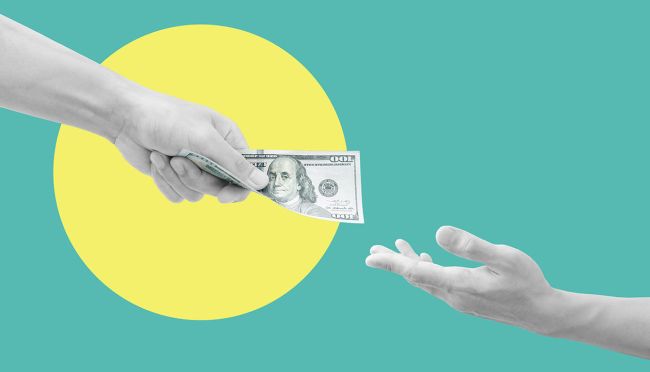
- 15 Aug 2023
Why Giving to Others Makes Us Happy
Giving to others is also good for the giver. A research paper by Ashley Whillans and colleagues identifies three circumstances in which spending money on other people can boost happiness.

- 13 Mar 2023
What Would It Take to Unlock Microfinance's Full Potential?
Microfinance has been seen as a vehicle for economic mobility in developing countries, but the results have been mixed. Research by Natalia Rigol and Ben Roth probes how different lending approaches might serve entrepreneurs better.

- 23 Jan 2023
After High-Profile Failures, Can Investors Still Trust Credit Ratings?
Rating agencies, such as Standard & Poor’s and Moody's, have been criticized for not warning investors of risks that led to major financial catastrophes. But an analysis of thousands of ratings by Anywhere Sikochi and colleagues suggests that agencies have learned from past mistakes.

- 29 Nov 2022
How Much More Would Holiday Shoppers Pay to Wear Something Rare?
Economic worries will make pricing strategy even more critical this holiday season. Research by Chiara Farronato reveals the value that hip consumers see in hard-to-find products. Are companies simply making too many goods?

- 21 Nov 2022
Buy Now, Pay Later: How Retail's Hot Feature Hurts Low-Income Shoppers
More consumers may opt to "buy now, pay later" this holiday season, but what happens if they can't make that last payment? Research by Marco Di Maggio and Emily Williams highlights the risks of these financing services, especially for lower-income shoppers.

- 01 Sep 2022
- What Do You Think?
Is It Time to Consider Lifting Tariffs on Chinese Imports?
Many of the tariffs levied by the Trump administration on Chinese goods remain in place. James Heskett weighs whether the US should prioritize renegotiating trade agreements with China, and what it would take to move on from the trade war. Open for comment; 0 Comments.

- 05 Jul 2022
Have We Seen the Peak of Just-in-Time Inventory Management?
Toyota and other companies have harnessed just-in-time inventory management to cut logistics costs and boost service. That is, until COVID-19 roiled global supply chains. Will we ever get back to the days of tighter inventory control? asks James Heskett. Open for comment; 0 Comments.

- 09 Mar 2022
War in Ukraine: Soaring Gas Prices and the Return of Stagflation?
With nothing left to lose, Russia's invasion of Ukraine will likely intensify, roiling energy markets further and raising questions about the future of globalization, says Rawi Abdelal. Open for comment; 0 Comments.

- 10 Feb 2022
Why Are Prices So High Right Now—and Will They Ever Return to Normal?
And when will sold-out products return to store shelves? The answers aren't so straightforward. Research by Alberto Cavallo probes the complex interplay of product shortages, prices, and inflation. Open for comment; 0 Comments.

- 11 Jan 2022
- Cold Call Podcast
Can Entrepreneurs and Governments Team Up to Solve Big Problems?
In 2017, Shield AI’s quadcopter, with no pilot and no flight plan, could clear a building and outpace human warfighters by almost five minutes. It was evidence that autonomous robots could help protect civilian and service member lives. But was it also evidence that Shield AI—a startup barely two years past founding—could ask their newest potential customer, the US government, for a large contract for a system of coordinated, exploring robots? Or would it scare them away? Harvard Business School professor Mitch Weiss and Brandon Tseng, Shield AI’s CGO and co-founder, discuss these and other challenges entrepreneurs face when working with the public sector, and how investing in new ideas can enable entrepreneurs and governments to join forces and solve big problems in the case, “Shield AI.” Open for comment; 0 Comments.

- 06 May 2021
How Four Women Made Miami More Equitable for Startups
A case study by Rosabeth Moss Kanter examines what it takes to break gender barriers and build thriving businesses in an emerging startup hub. Open for comment; 0 Comments.

- 20 Apr 2021
- Working Paper Summaries
The Emergence of Mafia-like Business Systems in China
This study sheds light on the political pathology of fraudulent, illegal, and corrupt business practices. Features of the Chinese system—including regulatory gaps, a lack of formal means of property protection, and pervasive uncertainty—seem to facilitate the rise of mafia systems.
- 02 Feb 2021
Nonprofits in Good Times and Bad Times
Tax returns from millions of US nonprofits reveal that charities do not expand during bad times, when need is the greatest. Although they are able to smooth the swings of their activities more than for-profit organizations, nonprofits exhibit substantial sensitivity to economic cycles.

- 01 Feb 2021

Has the New Economy Finally Arrived?
Economists have long tied low unemployment to inflation. James Heskett considers whether the US economic policy of the past four years has shaken those assumptions. Open for comment; 0 Comments.
- 06 Jan 2021
Aggregate Advertising Expenditure in the US Economy: What's Up? Is It Real?
We analyze total United States advertising spending from 1960 to 2018. In nominal terms, the elasticity of annual advertising outlays with respect to gross domestic product appears to have increased substantially beginning in the late 1990s, roughly coinciding with the dramatic growth of internet-based advertising.

- 11 Dec 2020
Economic Jitters Push Pandemic Job Seekers to Big Companies, Not Startups
Small companies are receiving fewer applications, particularly from experienced professionals, according to research by Shai Bernstein and colleagues. How can startups overcome pandemic fears and compete for talent? Open for comment; 0 Comments.
- 08 Dec 2020
Party-State Capitalism in China
China’s political economy has evolved from “state capitalism” to a distinctly party-driven incarnation. Party-state capitalism, via enhanced party monitoring and industrial policy, deepens ambiguity between the state and private sectors, and increases pressure on foreign capital, prioritizing the regime’s political survival above all.
- Utility Menu
44d3fa3df9f06a3117ed3d2ad6c71ecc
- Administration
research-banner.jpg

Current student and faculty research, initiatives, and resources in the department
Find Faculty by Economic Field
Behavioral Economics
Industrial Organization
Political economy.
Economic Development
International Economics
Public economics, econometrics, labor economics, financial economics, macroeconomics, economic history, research initiatives.
Our faculty-led initiatives showcase just some of the department's vast endeavors to further our understanding of the world through the lens of economics. Our current initiatives are listed below.

Foundations of Human Behavior Initiative
The Foundations of Human Behavior Initiative (FHB) supports research that produces transformative insights about the psychological, social, economic, political, and biological mechanisms that influence human behavior.

German Administrative Data Project
The Research Data Center (FDZ) of the German Federal Employment Agency (BA) in the Institute for Employment Research (IAB) facilitates access to micro data on the labor market for non-commercial empirical research.

The Lab for Economic Applications and Policy (LEAP) facilitates research related to government policy, with the aim of injecting scientific evidence into policy debates

Opportunity Insights
Opportunity Insights identifies barriers to economic opportunity and develop scalable solutions that will empower people throughout the United States to rise out of poverty and achieve better life outcomes.
The Weiss Fund
The Weiss Fund for Research in Development Economics is funded by the CRI Foundation and aims to sponsor research that will positively affect the lives of poor people in poor countries.

Faculty Feature
Professor Robin Lee and his co-author, Professor Kate Ho, have just been announced as the winners of the 2020 Frisch Medal of the Econometric Society for their paper “Insurer Competition in Health Care Markets”.

Student Feature
Elisa Rubbo is awarded the Padma Desai Prize in Economics and Jonathan Roth wins the David A. Well's Prize.
Research Resources

Use of Human Subjects
- Harvard FAS Human Subject Research Site
- Human Subject Payment Information

Research Agreements / Contracts
- Model Consulting Agreement of Harvard
- Harvard Legal Agreements Workflow, Negotiating Authority and Signing Authority

Research Travel Information
- Travel on Sponsored Funding
- Harvard Travel Services
- Global Support Services

Data Use Agreements
Learn more about data use agreements

Engaging Economic Research Topics in 2023: Unraveling Economic Complexities
Are you searching for economic research topics? If yes, then have a close look at some of the best economic research topics to try in 2023.
Economic research is a fundamental component of modern economics, as it provides a framework for understanding the complexities of the global economy. It encompasses a wide range of topics, including macroeconomics, microeconomics, econometrics, and applied economics, each with its own unique set of research questions and methodologies.
Economic research can be conducted using a variety of methods, including theoretical modeling, empirical analysis, and experimental research, and can be used to inform policy-making, advance knowledge, and address real-world economic problems. In this article, we will explore some of the key topics in economic research, including their theoretical underpinnings, research questions, and implications for economic policy and practice.
Whether you are a student, researcher, policymaker, or simply interested in economics, this article will provide an overview of some of the most important and relevant topics in contemporary economic research.
Definition of economic research
Table of Contents
Economic research refers to the application of economic theories and methodologies to study economic issues and problems, such as market behavior, consumer preferences, economic growth, income distribution, and international trade. It involves the use of empirical data, statistical models, and econometric techniques to develop insights into economic phenomena.
Importance of economic research
Economic research is important for several reasons:
Informing policy-making
Economic research can provide insights into the causes and consequences of economic phenomena, and help policymakers identify effective policies and interventions to promote social welfare, economic growth, and sustainability.
Advancing knowledge
Economic research contributes to our understanding of how the economy works, and can help us identify new areas of inquiry and build on existing knowledge.
Supporting innovation
Economic research can inform innovation and entrepreneurship by providing insights into consumer behavior, market dynamics, and technological change.
Addressing real-world problems
Economic research can help address real-world economic problems, such as income inequality, unemployment, and climate change, by identifying effective solutions and policy interventions.
Driving economic growth
Economic research can inform strategies to promote economic growth and development, such as through investment in education, infrastructure, and innovation.
Assessing risks and opportunities
Economic research can help individuals and organizations assess risks and opportunities in the economy, and make informed decisions about investments, financial planning, and other economic activities.
Enhancing accountability
Economic research can help hold individuals and organizations accountable for their economic decisions and actions, by providing evidence and insights into their economic impact.
Informing public discourse
Economic research can help shape public discourse on economic issues, by providing a deeper understanding of the economic implications of policy decisions, technological change, and other factors.
Fostering collaboration
Economic research can foster collaboration between researchers, policymakers, and other stakeholders, by providing a common language and framework for understanding economic issues and identifying shared solutions.
Encouraging critical thinking
Economic research can encourage critical thinking and a deeper understanding of complex economic issues, by challenging assumptions and providing evidence-based insights.
Overall, economic research plays a critical role in informing decision-making and promoting a more just and sustainable global economy.
Economic Research Topics
Have a close look at some of the best economic research topics.
Macroeconomics
Macroeconomics is the study of the economy as a whole, focusing on the aggregate behavior of economic variables such as GDP, inflation, employment, and trade. It aims to understand the causes and consequences of fluctuations in the economy, and to develop policies to stabilize the economy and promote economic growth. It’s not a very easy subject for students to understand, so an A-level economics tutor to understand the concepts better.
Topics for economic research in macroeconomics:
Economic growth and development
Economic growth is the increase in the output of goods and services over time, while development refers to the improvement in the well-being of individuals and societies. Research in this area can focus on factors that contribute to economic growth, such as investment, technology, and human capital , as well as on policies that promote inclusive development.
Inflation and deflation
Inflation is the sustained increase in the general price level of goods and services, while deflation is the opposite, a sustained decrease in the general price level. Research in this area can examine the causes and consequences of inflation and deflation, including their impact on economic growth, employment, and income distribution.
Monetary and fiscal policy
Monetary policy involves the use of interest rates, money supply, and other tools by central banks to influence economic activity, while fiscal policy involves the use of government spending and taxation to achieve economic objectives. Research in this area can examine the effectiveness of these policies, their impact on the economy, and their interaction with each other.
International trade and globalization
International trade refers to the exchange of goods and services between countries, while globalization refers to the integration of economies and societies across borders. Research in this area can examine the effects of trade and globalization on economic growth, income distribution, and employment, as well as on the environment, culture, and political systems.
Unemployment and labor market dynamics
Unemployment is the state of being without a job, while labor market dynamics refer to the behavior of employers and employees in the labor market. Research in this area can examine the causes and consequences of unemployment, the effects of minimum wages and other labor market policies, and the impact of technological change and globalization on the labor market.
Income inequality and poverty
Income inequality refers to the unequal distribution of income among individuals or groups, while poverty refers to the lack of basic necessities of life. Research in this area can examine the causes and consequences of income inequality and poverty, the role of education, health, and social policies in reducing poverty and inequality, and the impact of globalization and technological change on income distribution.
Microeconomics
Microeconomics is the study of individual economic behavior and decision-making, focusing on how individuals and firms interact in markets. It examines the behavior of consumers and producers, the determination of prices and quantities, and the effects of government policies on market outcomes.
Topics for economic research in microeconomics:
Market structures and competition
Market structure refers to the number and size of firms in a market, the degree of product differentiation, and the ease of entry and exit. Research in this area can examine the effects of market structure on competition, innovation, and pricing behavior, as well as the role of antitrust policies in promoting competition.
Consumer behavior and demand
Consumer behavior refers to the choices made by individuals when purchasing goods and services, while demand refers to the quantity of a good or service that consumers are willing and able to buy at a given price. Research in this area can examine the determinants of consumer behavior, the effects of advertising and product differentiation on demand, and the impact of consumer preferences on market outcomes.
Production and cost analysis
Production refers to the process of transforming inputs into outputs, while cost analysis refers to the study of the costs incurred by firms in producing goods and services. Research in this area can examine the determinants of production and cost, the effects of economies of scale and scope on cost, and the impact of technological change on production and cost.
Pricing strategies
Pricing strategies refer to the methods used by firms to set prices for their products or services. Research in this area can examine the determinants of pricing behavior, the effects of price discrimination and bundling on market outcomes, and the impact of pricing strategies on consumer welfare.
Game theory and strategic behavior
Game theory is a branch of economics that studies the behavior of individuals or firms in strategic situations, where the outcome of their actions depends on the actions of others. Research in this area can examine the use of game theory to model strategic interactions, the impact of strategic behavior on market outcomes, and the role of government policies in regulating strategic behavior.
Behavioral economics
Behavioral economics is the study of how psychological and social factors influence economic decision-making. Research in this area can examine the role of cognitive biases and heuristics in economic behavior, the effects of social norms and peer pressure on economic outcomes, and the implications of behavioral economics for public policy.
Econometrics
Econometrics is the application of statistical methods to economic data in order to test economic theories, estimate economic relationships, and make economic forecasts. It is a key tool for empirical research in economics.
Topics for economic research in econometrics
Statistical inference and hypothesis testing
Statistical inference involves making conclusions about population parameters based on sample data, while hypothesis testing involves testing hypotheses about the values of population parameters. Research in this area can examine the use of statistical inference and hypothesis testing in econometric analysis, as well as the limitations and challenges associated with these methods.
Time series analysis
Time series analysis involves the analysis of data that is collected over time, such as economic indicators like GDP, inflation, and unemployment. Research in this area can examine the use of time series methods in econometric analysis, such as autoregressive models and moving average models, as well as the challenges associated with analyzing time series data.
Panel data analysis
Panel data refers to data that is collected on the same individuals or entities over time, such as data on firms or households. Panel data analysis involves using this data to estimate economic relationships and test economic theories. Research in this area can examine the use of panel data methods in econometric analysis, such as fixed effects models and random effects models, as well as the advantages and disadvantages of panel data analysis.
Causal inference and program evaluation
Causal inference involves determining whether a particular treatment or policy intervention caused a particular outcome, while program evaluation involves evaluating the effectiveness of policy interventions. Research in this area can examine the use of causal inference and program evaluation methods in econometric analysis, such as randomized controlled trials and difference-in-differences models, as well as the challenges associated with these methods.
Big data and machine learning in economics
Big data refers to the large volumes of data that are generated in the digital age, while machine learning involves using algorithms to analyze and make predictions based on data. Research in this area can examine the use of big data and machine learning methods in econometric analysis, as well as the challenges associated with analyzing large and complex data sets.
Spatial econometrics
Spatial econometrics is concerned with the analysis of spatially dependent economic variables, such as regional economic growth and urbanization. Research in this area can examine the use of spatial econometric models in econometric analysis, such as spatial autoregressive models and spatial panel models, as well as the challenges associated with analyzing spatial data.
Applied economics
Applied economics involves the application of economic principles and theories to real-world problems and issues. It is concerned with the practical implications of economic research, and often involves interdisciplinary collaborations with other fields, such as public policy, business, and social sciences.
Topics for economic research in applied economics:
Health economics
Health economics is concerned with the analysis of healthcare systems and the economic factors that affect the health of individuals and populations. Research in this area can examine topics such as healthcare financing and insurance, healthcare delivery and organization, healthcare technology and innovation, and the social determinants of health.
Education economics
Education economics is concerned with the analysis of educational systems and the economic factors that affect educational outcomes. Research in this area can examine topics such as education financing and funding, educational inequality and access, education quality and performance, and the impact of education on economic growth and development.
Environmental economics
Environmental economics is concerned with the economic analysis of environmental problems and the policies and mechanisms that can be used to address these problems. Research in this area can examine topics such as climate change, pollution and waste management, natural resource management, and environmental regulation and policy.
Urban economics
Urban economics is concerned with the economic analysis of cities and urban areas, including the economic factors that drive urban growth and development, the impact of urbanization on social and economic outcomes, and the policies and mechanisms that can be used to promote sustainable and inclusive urban development.
Agricultural economics
Agricultural economics is concerned with the economic analysis of the agricultural sector, including the factors that affect agricultural production and productivity, the impact of agricultural policies and programs on rural development and poverty reduction, and the role of agriculture in food security and nutrition.
Development economics
Development economics is concerned with the economic analysis of development processes and the policies and mechanisms that can be used to promote economic growth and development. Research in this area can examine topics such as poverty reduction and social welfare, trade and globalization, financial markets and development, and the role of institutions and governance in development.
In summary, economics research covers a wide range of topics and approaches, including macroeconomics, microeconomics, econometrics, and applied economics.
Some key topics for research in economics include economic growth and development, market structures and competition, statistical inference and hypothesis testing, health economics, education economics, environmental economics, urban economics, agricultural economics, and development economics.
As the world continues to face complex economic challenges, there is a growing need for rigorous and innovative research in economics to inform policy-making and address pressing issues such as inequality, climate change, and technological disruption.
Future research in economics will likely involve interdisciplinary collaborations with other fields such as data science, engineering, and behavioral sciences.
Additionally, there will be an increasing focus on incorporating diverse perspectives and experiences in economic research, as well as addressing issues of ethics and social responsibility in economic analysis.
Overall, the future of economics research holds great potential to contribute to a more just and sustainable global economy.
Frequently Asked Questions
What is economics research.
Economics research involves the application of economic theories and methods to understand and address real-world economic problems and issues. It can involve a range of approaches, from theoretical modeling and econometric analysis to field experiments and case studies.
What are some key areas of economics research?
Some key areas of economics research include macroeconomics, microeconomics, econometrics, and applied economics. Within these areas, researchers may focus on topics such as economic growth, market competition, statistical analysis, health economics, environmental economics, urban economics, and development economics.
Why is economics research important?
Economics research plays a critical role in informing policy-making and decision-making in a range of fields, from government and business to international organizations and non-profit organizations. By providing insights into the causes and consequences of economic phenomena, economics research can help to identify effective policies and interventions to promote social welfare, economic growth, and sustainability.
What are some emerging trends in economics research?
Emerging trends in economics research include a growing focus on interdisciplinary collaborations with other fields, such as data science and behavioral science, as well as an increasing emphasis on incorporating diverse perspectives and experiences into economic analysis.
How is economics research conducted?
Economics research can be conducted using a range of methods, including theoretical modeling, econometric analysis, field experiments, and case studies. Researchers may also use data from a variety of sources, including surveys, administrative records, and experimental data.
Similar Articles

Top 19 Tips & Tricks On How To Improve Grades?
Do you want to improve your grades? If yes, then don’t worry! In this blog, I have provided 19 tips…

How To Study For Final Exam – 12 Proven Tips You Must Know
How To Study For Final Exam? Studying for the final exam is very important for academic success because they test…
Leave a Comment Cancel Reply
Your email address will not be published. Required fields are marked *
This site uses Akismet to reduce spam. Learn how your comment data is processed .
Measuring the Commercial Potential of Science
This paper uses a large language model to develop an ex-ante measure of the commercial potential of scientific findings. In addition to validating the measure against the typical holdout sample, we validate it externally against 1.) the progression of scientific findings through a major university’s technology transfer process and 2.) firms’ use of the academic science of major American research universities. We then illustrate the measure’s utility by applying it to two questions. First, does the patenting of academic research by universities impede its breadth of use by firms? Second, to illustrate how this measure can advance our understanding of the determinants of firms’ use of science generally, we use it to analyze how one factor, universities’ reputations for generating commercializable science, impacts firms’ use of academic science. For the former question, using our measure to control for commercializable science, we find that patenting does not dampen the dissemination of academic science in industry. For the second, we find that reputation per se, apart from the production of commercializable science, impacts industry’s use of science, especially for that science with high commercial potential, implying that the commercializable science of less prominent universities is disproportionately overlooked by industry.
Authorship in reverse alphabetical order. Sharique Hasan would like to thank the Kauffman Foundation, which funded this study through their knowledge challenge grant #G-201806-4738. The authors would also like to thank seminar participants at Duke, Bocconi, University of Maryland, NBER i3 Conference, Entrepreneurship and Innovation Policy Research Seminar, as well as helpful feedback from Ashish Arora, Dan Gross, Lee Fleming, Matt Marx, Robin Rasor, Yoko Shibuya, and John Walsh. The views expressed herein are those of the authors and do not necessarily reflect the views of the National Bureau of Economic Research.
MARC RIS BibTeΧ
Download Citation Data
- Data: Measure of the Commercial Potential of Science
More from NBER
In addition to working papers , the NBER disseminates affiliates’ latest findings through a range of free periodicals — the NBER Reporter , the NBER Digest , the Bulletin on Retirement and Disability , the Bulletin on Health , and the Bulletin on Entrepreneurship — as well as online conference reports , video lectures , and interviews .

Making the future too bright: How wishful thinking can point us in the wrong direction
Everyone indulges in wishful thinking now and again. But when is that most likely to happen and when could it actually be harmful? A new study, led by the University of Amsterdam (UvA), demonstrates unequivocally that the greater the insecurity and anxiety of a situation, the more likely people are to become overly optimistic -- even to the point where it can prevent us from taking essential action. The study's results have now been published in the journal American Economic Review .
'People aren't purely truth-seekers -- many beliefs are influenced by emotions and driven by what is pleasant or comforting. Like belief in an afterlife or optimism about health outcomes,' says Joël van der Weele, professor of Economic Psychology at the UvA. Working alongside professor of Neuroeconomics Jan Engelmann and an international team, Van der Weele set out to answer whether people become overly optimistic when facing potential hardships. 'So far studies haven't provided clear evidence for wishful thinking, with many not backing up the idea,' explains Engelmann. 'But these mainly focused on positive outcomes, like winning a lottery. We examined how both positive and negative outcomes influence biased beliefs.'
Choosing the most pleasant outcome
Understanding self-deception and its causes is difficult in real-world situations. The study involved a set of experiments with over 1,700 participants, conducted in a lab and online. Participants were briefly shown various patterns, such as sets of differently oriented stripes or coloured dots, and were asked what kind of pattern they saw. Some of these patterns were linked to a negative outcome to induce anxiety, either a mild and non-dangerous electrical shock (in the lab) or a loss of money (online). 'We wanted to see if people make more mistakes in recognising patterns associated with a negative outcome, thinking it was actually a harmless pattern. That would indicate wishful thinking,' explains Van der Weele.
The study consistently found that participants were less likely to correctly identify patterns associated with a shock or loss. 'The participants tended to see a pattern that aligned with what was more desirable,' Engelmann says. 'Previous research looked at wishful thinking related to positive outcomes and found mixed results, with many studies not finding an effect. Our study demonstrates very clearly that the negative emotion of anxiety about an outcome leads to wishful thinking.'
Making people more realistic
The researchers also tested interventions designed to make people more realistic. The first involved making the patterns easier to recognise. 'Reducing uncertainty did indeed turn out to reduce wishful thinking,' says Van der Weele. The second intervention was to offer higher potential earnings for correct pattern recognition. This intervention had little effect, except when participants could gather more evidence about the exact pattern they were shown. 'When people had more time to collect evidence and were better rewarded for a correct answer, they became more realistic,' explains Engelmann.
Finally, in the experiments where negative outcomes were replaced by positive outcomes, participants showed no wishful thinking. According to the authors this shows that reducing negative emotions can lessen overoptimism.
Wishful thinking in the 'real world'
The authors recognise that wishful thinking can be useful because it helps us deal with bad feelings and manage uncertainty. Engelmann: 'Wishful thinking is important for humans in coping with anxiety about possible future events.' For Van der Weele and Engelmann, the concern is situations in which too much optimism stops people from getting the information they need or from acting in a way that would benefit them. 'People can get too hopeful when things are uncertain. We observe this happening with climate change, when financial markets fluctuate, and even in personal health situations when people avoid medical help because they think everything will be fine. We need to know more about when wishful thinking helps and when it hurts.'
- Anger Management
- Consumer Behavior
- Environmental Policies
- Public Health
- Resource Shortage
- Culture of fear
- Schizophrenia
- Negotiation
- Illusion of control
- General anxiety disorder
- Psychopharmacology
Story Source:
Materials provided by Universiteit van Amsterdam . Note: Content may be edited for style and length.
Journal Reference :
- Jan B. Engelmann, Maël Lebreton, Nahuel A. Salem-Garcia, Peter Schwardmann, Joël J. van der Weele. Anticipatory Anxiety and Wishful Thinking . American Economic Review , 2024; 114 (4): 926 DOI: 10.1257/aer.20191068
Cite This Page :
Explore More
- Illuminating Oxygen's Journey in the Brain
- DNA Study IDs Descendants of George Washington
- Heart Disease Risk: More Than One Drink a Day
- Unlocking Supernova Stardust Secrets
- Why Do Some Memories Become Longterm?
- Cell Division Quality Control 'Stopwatch'
- What Controls Sun's Differential Rotation?
- Robot, Can You Say 'Cheese'?
- Researchers Turn Back the Clock On Cancer Cells
- Making Long-Term Memories: Nerve-Cell Damage
Trending Topics
Strange & offbeat.
share this!
March 28, 2024
This article has been reviewed according to Science X's editorial process and policies . Editors have highlighted the following attributes while ensuring the content's credibility:
fact-checked
peer-reviewed publication
trusted source
Tuberculosis vaccine may enable elimination of the disease in cattle by reducing its spread
by University of Cambridge
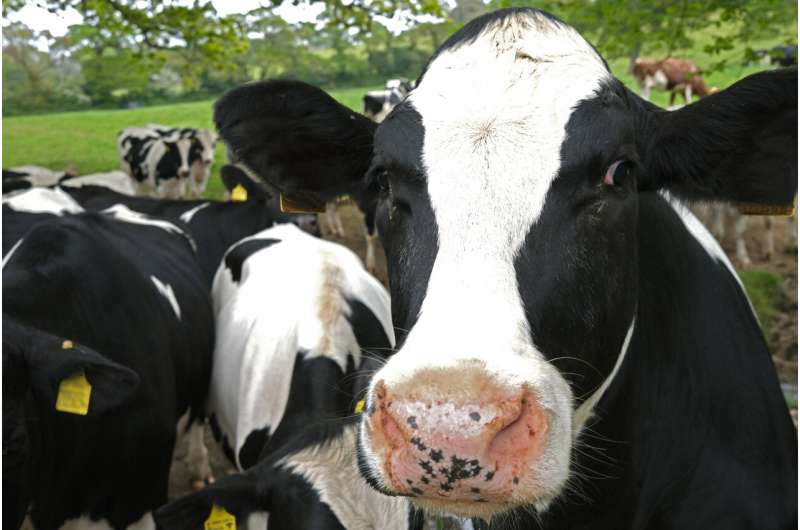
Vaccination not only reduces the severity of TB in infected cattle, but reduces its spread in dairy herds by 89%, research finds. The research, led by the University of Cambridge and Penn State University, improves prospects for the elimination and control of bovine tuberculosis (TB), an infectious disease of cattle that results in large economic costs and health impacts across the world. The study is published in the journal Science .
This is the first study to show that BCG-vaccinated cattle infected with TB are substantially less infectious to other cattle. This remarkable indirect effect of the vaccine beyond its direct protective effect has not been measured before.
The spillover of infection from livestock has been estimated to account for about 10% of human tuberculosis cases. While such zoonotic TB (zTB) infections are most commonly associated with gastrointestinal infections related to drinking contaminated milk, zTB can also cause chronic lung infections in humans. Lung disease caused by zTB can be indistinguishable from regular tuberculosis, but is more difficult to treat due to natural antibiotic resistance in the cattle bacteria.
TB remains endemic in many countries around the world, including in Europe and the Americas, where its control costs farmers and taxpayers hundreds of millions of dollars each year.
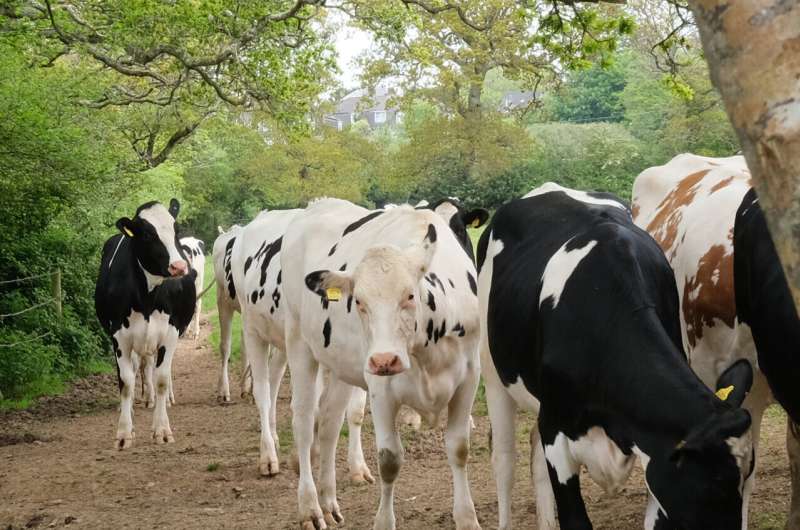
In the study, carried out in Ethiopia, researchers examined the ability of the vaccine, Bacillus Calmette-Guérin (BCG), to directly protect cattle that receive it, as well as to indirectly protect both vaccinated and unvaccinated cattle by reducing TB transmission. Vaccinated and unvaccinated animals were put into enclosures with naturally infected animals, in a novel crossover design performed over two years.
"Our study found that BCG vaccination reduces TB transmission in cattle by almost 90%. Vaccinated cows also developed significantly fewer visible signs of TB than unvaccinated ones. This suggests that the vaccination not only reduces the progression of the disease, but that if vaccinated animals become infected, they are substantially less infectious to others," said Andrew Conlan, Associate Professor of Epidemiology at the University of Cambridge's Department of Veterinary Medicine and a corresponding author of the study.
Using livestock census and movement data from Ethiopia, the team developed a transmission model to explore the potential for routine vaccination to control bovine tuberculosis.
"Results of the model suggest that vaccinating calves within the dairy sector of Ethiopia could reduce the reproduction number of the bacterium—the R 0 —to below 1, arresting the projected increase in the burden of disease and putting herds on a pathway towards elimination of TB," Conlan said.
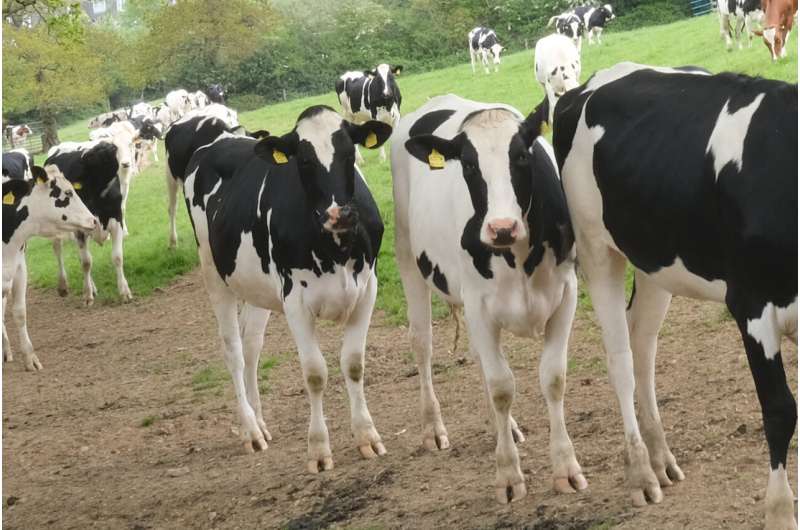
The team focused their studies in Ethiopia, a country with the largest cattle herd in Africa and a rapidly growing dairy sector that has a growing burden of bovine tuberculosis and no current control program, as a representative of similarly situated transitional economies.
"Bovine tuberculosis is largely uncontrolled in low- and middle-income countries , including Ethiopia," said Abebe Fromsa, associate professor of agriculture and veterinary medicine at Addis Ababa University in Ethiopia and the study's co-lead author. "Vaccination of cattle has the potential to provide significant benefits in these regions."
"For over a hundred years, programs to eliminate bovine tuberculosis have relied on intensive testing and slaughtering of infected animals," said Vivek Kapur, professor of microbiology and infectious diseases and Huck Distinguished Chair in Global Health at Penn State and a corresponding author of the study.
He added, "This approach is unimplementable in many parts of the world for economic and social reasons, resulting in considerable animal suffering and economic losses from lost productivity, alongside an increased risk of spillover of infection to humans. By vaccinating cattle, we hope to be able to protect both cattle and humans from the consequences of this devastating disease."
Professor James Wood, Alborada Professor of Equine and Farm Animal Science in the University of Cambridge's Department of Veterinary Medicine, noted that despite TB being more prevalent in lower-income countries, the United Kingdom, Ireland and New Zealand also experience considerable economic pressures from the disease which continues to persist despite intensive and costly control programs.
Wood said, "For over 20 years the UK government has pinned hopes on cattle vaccination for bovine tuberculosis as a solution to reduce the disease and the consequent costs of the controls. These results provide important support for the epidemiological benefit that cattle vaccination could have to reduce rates of transmission to and within herds."
Journal information: Science
Provided by University of Cambridge
Explore further
Feedback to editors

A cosmic 'speed camera' just revealed the staggering speed of neutron star jets in a world first
7 hours ago

Saturday Citations: 100-year-old milk, hot qubits and another banger from the Event Horizon Telescope project
10 hours ago

Curiosity rover searches for new clues about Mars' ancient water
13 hours ago

Study says since 1979 climate change has made heat waves last longer, spike hotter, hurt more people
14 hours ago

Scientist taps into lobsters' unusual habits to conquer the more than 120-year quest to farm them
Mar 29, 2024

Blind people can hear and feel April's total solar eclipse with new technology

Mapping the best route for a spacecraft traveling beyond the sun's sphere of influence

Researchers outline new approach in search for dark matter through future DUNE research project

Researchers reveal evolutionary path of important proteins

Study identifies protein responsible for gas vesicle clustering in bacteria
Relevant physicsforums posts, what do large moles on the body indicate, avian flu - a new study led by a team from the university of maryland.
Mar 27, 2024
Are all biological catabolic reactions exergonic?
Mar 20, 2024
A First of Its Kind: A Calcium-based signal in the Human Brain
Mar 18, 2024
Biological culture and cultural biology
Mar 17, 2024
Potentially fatal dog parasite found in the Colorado River
Mar 15, 2024
More from Biology and Medical
Related Stories
Cost and scale of field trials for bovine tb vaccine may make them unfeasible, study suggests.
Jun 7, 2018

New vaccine will stop the spread of bovine tuberculosis
Nov 28, 2019

New tuberculosis tests pave way for cow vaccination programs
Jul 17, 2019

Clues of tuberculosis spread between cows and badgers
Dec 18, 2019

CDC says people can contract tuberculosis from deer
Oct 1, 2019

What's the best way to prevent tuberculosis transmission from wildlife to cattle?
Aug 23, 2023
Recommended for you

Study highlights the potential of cyanobacteria as biofertilizers

Researchers discover key gene for toxic alkaloid in barley
Mar 28, 2024

Milk on ice: Antarctic time capsule of whole milk powder sheds light on the enduring qualities of dairy products

Cross-species insights: Study finds calcium link in plant and animal immunity

Sweet success: Researchers crack sugarcane's complex genetic code
Let us know if there is a problem with our content.
Use this form if you have come across a typo, inaccuracy or would like to send an edit request for the content on this page. For general inquiries, please use our contact form . For general feedback, use the public comments section below (please adhere to guidelines ).
Please select the most appropriate category to facilitate processing of your request
Thank you for taking time to provide your feedback to the editors.
Your feedback is important to us. However, we do not guarantee individual replies due to the high volume of messages.
E-mail the story
Your email address is used only to let the recipient know who sent the email. Neither your address nor the recipient's address will be used for any other purpose. The information you enter will appear in your e-mail message and is not retained by Phys.org in any form.
Newsletter sign up
Get weekly and/or daily updates delivered to your inbox. You can unsubscribe at any time and we'll never share your details to third parties.
More information Privacy policy
Donate and enjoy an ad-free experience
We keep our content available to everyone. Consider supporting Science X's mission by getting a premium account.
E-mail newsletter
Read our research on: Abortion | Podcasts | Election 2024
Regions & Countries
Key facts about asian americans living in poverty.
Asian Americans are often portrayed as educationally and financially successful when compared with other racial or ethnic groups. However, Asian origin groups in the United States vary widely in their economic status and education level . Indeed, more than 2.3 million Asian Americans – about one-in-ten – lived in poverty in 2022, according to a Pew Research Center analysis of U.S. Census Bureau data.
Learn more about Asian Americans’ experiences with economic hardship in our data essay and short film .
Here are nine facts about Asian Americans living in poverty.
Pew Research Center conducted this analysis to better understand the characteristics, experiences and views of Asian Americans living in poverty today. It is part of a three-part study that includes an analysis of 18 focus groups conducted with 144 Asians living with economic hardship completed in February 2023 and a short film about Asian families who have experienced economic hardship .
This analysis is based on two main data sources. The first data source is the U.S. Census Bureau’s 2022 American Community Survey (ACS) provided through Integrated Public Use Microdata Series (IPUMS) from the University of Minnesota. In this analysis, poverty status is determined using the 2022 federal poverty line for the 48 contiguous states and the District of Columbia, Alaska, or Hawaii, depending on respondents’ state of residence, published by the U.S. Department of Health and Human Services. For example, a family of four living in 48 contiguous states and the District of Columbia were categorized as living “in poverty” if they make a yearly income of $27,750 or less.
The second data source is Pew Research Center’s 2022-23 survey of Asian American adults, conducted from July 2022 to January 2023 in six languages among 7,006 respondents. The survey analysis included 561 Asian adults whose approximate family income is at or below the 2022 federal poverty line for the 48 contiguous states and the District of Columbia, regardless of their state of residence. For more details, refer to the survey methodology . For questions used in this analysis, refer to the topline questionnaire .
Pew Research Center is a subsidiary of The Pew Charitable Trusts, its primary funder. The Center’s Asian American portfolio was funded by The Pew Charitable Trusts, with generous support from The Asian American Foundation; Chan Zuckerberg Initiative DAF, an advised fund of the Silicon Valley Community Foundation; the Robert Wood Johnson Foundation; the Henry Luce Foundation; the Doris Duke Foundation; The Wallace H. Coulter Foundation; The Dirk and Charlene Kabcenell Foundation; The Long Family Foundation; Lu-Hebert Fund; Gee Family Foundation; Joseph Cotchett; the Julian Abdey and Sabrina Moyle Charitable Fund; and Nanci Nishimura.
We would also like to thank the Leaders Forum for its thoughtful leadership and valuable assistance in helping make this survey possible.
The strategic communications campaign used to promote the research was made possible with generous support from the Doris Duke Foundation.
The terms Asians and Asian Americans are used interchangeably throughout this post to refer to individuals who self-identify as Asian, either alone or in combination with other races or Hispanic identity.
The terms living in poverty and living near or below the federal poverty line are used interchangeably throughout this post to refer to those whose family income is close to or below the 2022 federal poverty line.
- For results on Asian adults from the survey , this refers to adults whose approximate family income falls at or below 100% of the federal poverty line.
- For data on the total U.S. Asian population from the U.S. Census Bureau , this refers to all Asian Americans whose family income is at or below 100% of the federal poverty line.
The term U.S. born refers to people who are U.S. citizens at birth, including people born in the 50 U.S. states, the District of Columbia, Puerto Rico, or other U.S. territories, as well as those born elsewhere to at least one parent who is a U.S. citizen.
The term immigrants , when referring to Census Bureau data, includes those who were not U.S. citizens at birth – in other words, those born outside the 50 U.S. states or the District of Columbia, Puerto Rico, or other U.S. territories to parents who were not U.S. citizens. When referring to survey respondents, this group only includes those born outside the 50 U.S. States or the District of Columbia, Puerto Rico or other U.S. territories.
About 10% of Asian Americans overall live in poverty, but poverty rates vary widely across origin groups. Burmese (19%) and Hmong Americans (17%) were among the Asian origin groups with the highest poverty rates in 2022. Meanwhile, Filipino (7%) and Indian Americans (6%) were among the groups with the lowest poverty rates.
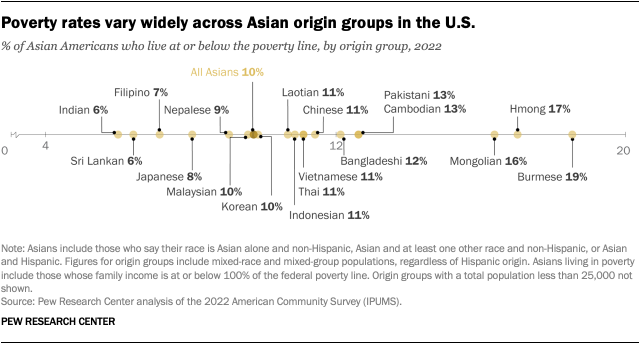
A third of Asian Americans ages 25 and older who live in poverty have a bachelor’s degree. By comparison, among non-Asians 25 and older who live in poverty, only 14% have a bachelor’s degree.
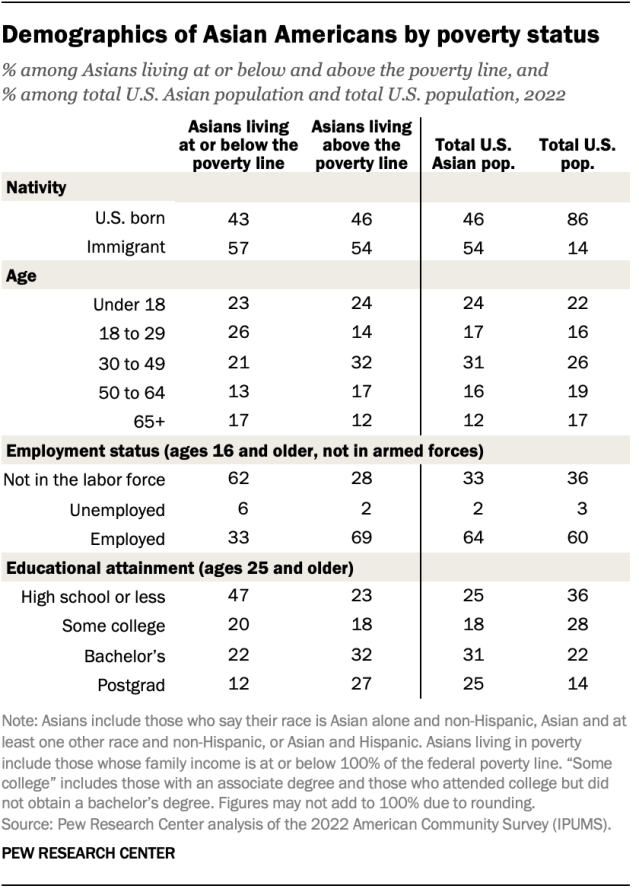
Asian Americans 25 and older with at least a bachelor’s degree are still less likely to live in poverty (5%) than those with less formal education (13%).
Nearly six-in-ten Asian Americans who live in poverty are immigrants. And relatively few of these immigrants speak English proficiently.
Among Asian immigrants ages 5 and older living below the poverty line, 44% are proficient in English (meaning they either speak only English or speak the language very well). By comparison, 61% of those immigrants above the poverty line speak English proficiently.
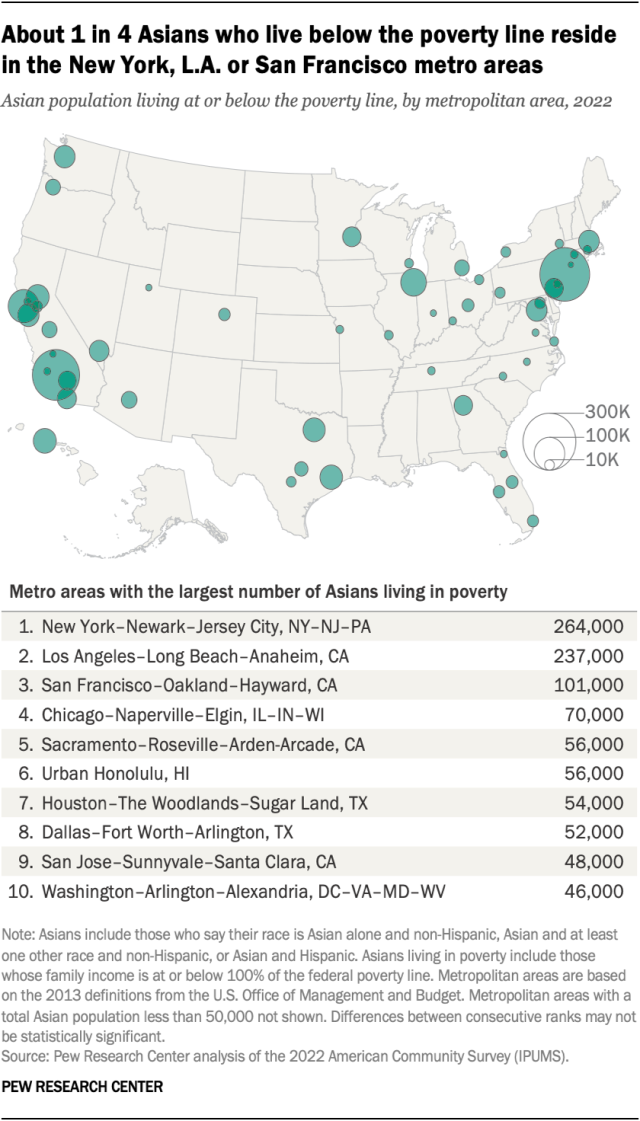
About 1 million Asians who are below the poverty line live in 10 U.S. metropolitan areas. In fact, more than 500,000 live in just three metropolitan areas: New York City, Los Angeles and San Francisco. These metro areas each have about 100,000 or more Asians living in poverty, and together they hold 26% of all Asian Americans living in poverty.
Fresno, California (19%), Buffalo, New York (18%) and Pittsburgh, Pennsylvania (15%) are among the metro areas with the highest poverty rates among Asian Americans. Still, Asian Americans who live in poverty largely reside in places with larger Asian populations than these metro areas.
Refer to a downloadable spreadsheet for detailed data on the number and share of Asians living in poverty by metro area.
Around eight-in-ten Asian adults who live in poverty (79%) have experienced financial challenges in some way in the past 12 months, according to a Pew Research Center survey of Asian adults conducted in 2022 and 2023. By contrast, 48% of Asian adults living above the poverty line say they have experienced the same. Among the specific financial challenges they faced:
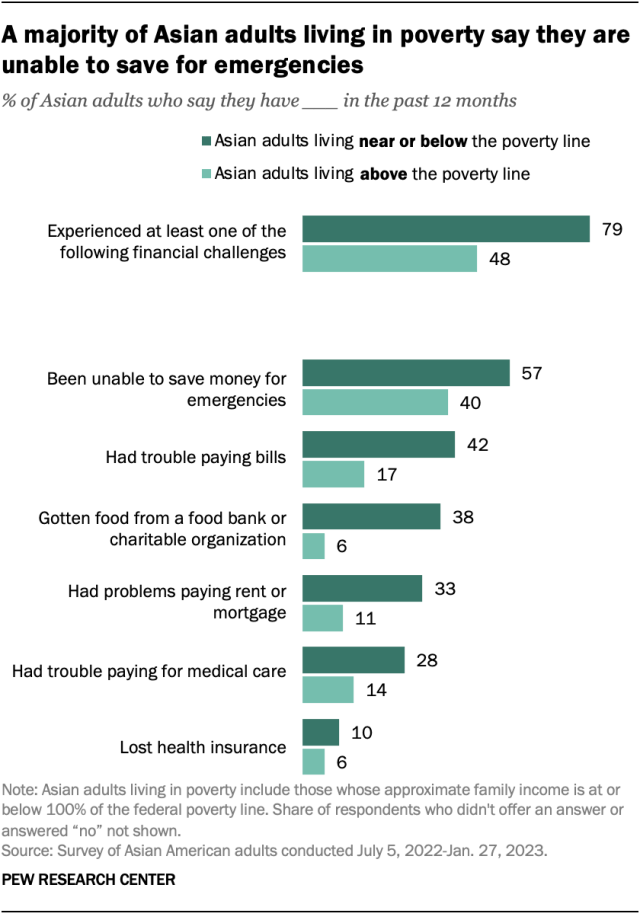
- 57% of Asian adults living in poverty were unable to save for emergencies, compared with 40% of Asian adults living above the poverty line.
- 42% had trouble paying their bills, more than twice the share of Asian adults living above the poverty line who said the same (17%).
- 38% have gotten food from a food bank or charitable organization, about six times the share among Asians living above the poverty line (6%).
Financial difficulties tend to come in bundles: Among those living in poverty who say they experienced at least one of the financial challenges asked about, 65% experienced two or more.
A majority of Asian adults who live in poverty (61%) have turned to family or friends for help with bills, housing, food or employment.
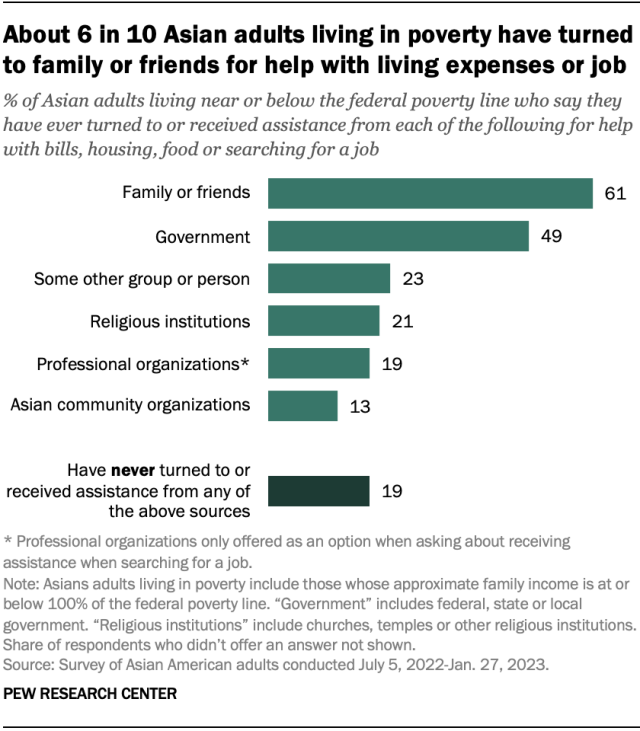
A large share (49%) also say they have sought help from local, state or federal governments. Smaller shares have sought help from religious institutions such as churches or temples (21%) or Asian community groups (13%).
However, 19% of Asian adults living in poverty say they have not sought help from any of the sources asked about in the survey.
Why Asian immigrants came to the U.S. is linked to whether they have received help from the government. For example, a third of all Asian immigrants, regardless of poverty status, who came to the U.S. due to conflict or persecution in their home country have received help with bills, housing, food or employment from governments (33%). By comparison, smaller shares of Asian immigrants who came for educational opportunities (14%) or economic opportunities (16%) or who migrated to be with family (25%) say the same.
Roughly half of Asian Americans who live in poverty (47%) say the American dream is out of reach, but others say they have achieved it (15%) or are on their way to achieving it (36%). By comparison, Asians living above the poverty line are more optimistic about their chances of achieving the American dream: 26% say it is out of reach for them, while 27% say they have achieved it and 46% say they are on their way to achieving it.
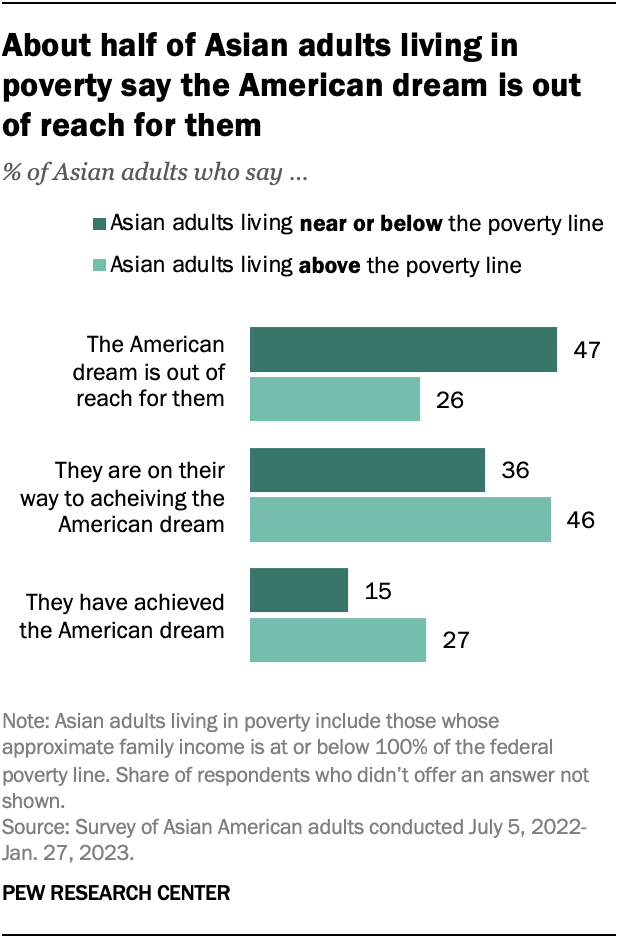
Asian adults who live below the poverty line and those who live above it have similar views on what’s important to achieving the American dream. For Asians living in poverty, the vast majority say having freedom of choice in how to live one’s life (91%), a good family life (91%), children having the best opportunities (91%) and retiring comfortably (90%) are important to their view of the American dream. Among Asian adults living above the poverty line, similar shares say these elements are important.
Homeownership is also seen as key: 81% of Asian adults living in poverty and 87% of those living above the poverty line say owning a home is important to their view of the American dream. However, Asian adults in poverty are much less likely than those above the poverty line to be homeowners (40% vs. 71%), according to Census Bureau data.
Note: For more details, refer to the survey methodology . For questions used in this analysis, refer to the topline questionnaire .

Sign up for our weekly newsletter
Fresh data delivered Saturday mornings
Bangladeshis in the U.S. Fact Sheet
Key facts about asian americans, a diverse and growing population, key facts about asian origin groups in the u.s., asian americans are the fastest-growing racial or ethnic group in the u.s., demographic and economic data on the thai immigrant and u.s.-born populations in the united states., most popular.
About Pew Research Center Pew Research Center is a nonpartisan fact tank that informs the public about the issues, attitudes and trends shaping the world. It conducts public opinion polling, demographic research, media content analysis and other empirical social science research. Pew Research Center does not take policy positions. It is a subsidiary of The Pew Charitable Trusts .

IMAGES
VIDEO
COMMENTS
Development Economics Research Topics. The relation between development and incentive for migration. The economic consequences of population growth in developing countries. The determinants of high-performing institutions in emerging economies. The impact of globalization on income distribution in emerging economies.
Macroeconomics Research Topics. 1. The relationship between economic growth and unemployment in [your country] 2. Global recession and factors that contribute to it. 3. Impact of government expenditure on economic growth in [country] 4. The impact of company income tax revenue on the developing economies- A comparative analysis of Kenya, India ...
Economics Research Topics are as follows: The impact of technological change on income inequality. An analysis of the relationship between exchange rates and foreign direct investment. The effects of tax incentives on small business growth and development. The determinants of economic growth in developing countries.
Research; All Topics Topics. All NBER research is categorized into topic areas that collectively span the field of economics. Featured Topics. COVID-19. Included in this topic ... National Bureau of Economic Research. Contact Us 1050 Massachusetts Avenue Cambridge, MA 02138 617-868-3900
Research papers • Length: approximately 25 double-spaced pages. -More on this in a moment… • Content: new theoretical or empirical research. -Not simply a survey of existing research -More than speculation • How to find a topic: start with the topics covered in this course. -You need a well-defined question or hypothesis
A high-quality economics paper typically exhibits three key attributes: (1) a riveting question rooted in economic theories or current economic affairs, (2) an insightful assessment of how the current study adds value to the existing body of research on the same topic, and (3 a keen
Topics of research arranged by field and faculty member. Can hospital desegregation in the American South during the 1960s explain the narrowing of the black-white test score gap in the 1980s; the racial convergence in college enrollment rates in the early 1990s; and the fall in the black-white earnings gap from the late 1990s to the early 2000s?
Tips on how to choose economics research topics. One of the biggest and challenging tasks is to come up with that first lengthy economics research paper. However, in order to name that task, an economics research topic is a must. Picking the best economics research topics is an issue most learners pursuing economics studies come across.
Don't be a perfectionist: Once you have started on a good question, a typical project in economics should yield a draft within six months. (But do the best you can) Don't procrastinate: Set realistic goals. Make sure you are working on SOMETHING all the time, even if it is a modest project. Giving a presentation in the work-in-progress ...
This list of economics research paper topics is intended to provide students and researchers with a comprehensive guide for selecting research topics in the field of economics. The guide is organized into 20 categories covering a broad range of economic research topics. These categories include economic theory, microeconomics, macroeconomics, econometrics, international economics, behavioral ...
The economics of alcohol abuse problems. In this thesis, students can develop several essential issues. First, they can examine how poverty is connected to alcohol abuse. Second, they can see the link between alcohol consumption and productivity. To sum up, students can elaborate on the economic costs of alcohol abuse.
Research questions have a few characteristics. They're open-ended. (They can't be answered with a simple yes or no response.) They're often measurable through quantitative data or qualitative measures. They summarize the issue/topic being researched. They may take a fresh look at an issue or try to solve a problem. In addition, research ...
Economics Research Questions. Formulating a research question is a crucial step in conducting an economics research project. A good research question should be specific, measurable, and relevant to the topic under study. Here are some economics research questions to consider: How does widespread adoption of digital currencies impact traditional ...
What Is An Economics Research Paper? How Does One Write An Economics Research Paper? Summary Reminders for Next Week What Is an "Economic" Question? Economic questions ask: 1 How would an individual/group solve a particular problem, or respond to a particular incentive? E.g. If the interest rate on a savings account increases by 5%,
This page provides a comprehensive guide to economic theory research paper topics, aimed at students studying economics.The keyphrase for this page is "economic theory research paper topics". The page offers 10 categories with 10 topics in each, expert advice on choosing and writing a research paper, and an overview of iResearchNet's custom writing services for students.
This study sheds light on the political pathology of fraudulent, illegal, and corrupt business practices. Features of the Chinese system—including regulatory gaps, a lack of formal means of property protection, and pervasive uncertainty—seem to facilitate the rise of mafia systems. 02 Feb 2021. Working Paper Summaries.
The first question asks for a ready-made solution, and is not focused or researchable. The second question is a clearer comparative question, but note that it may not be practically feasible. For a smaller research project or thesis, it could be narrowed down further to focus on the effectiveness of drunk driving laws in just one or two countries.
Research Spotlights. Founded in 1920, the NBER is a private, non-profit, non-partisan organization dedicated to conducting economic research and to disseminating research findings among academics, public policy makers, and business professionals.
6 Communicate your findings. The final step is to communicate your findings for your research. This is the process of presenting and discussing the results and implications of your data analysis ...
The Weiss Fund for Research in Development Economics is funded by the CRI Foundation and aims to sponsor research that will positively affect the lives of poor people in poor countries. Learn more. Faculty Feature. Professor Robin Lee and his co-author, Professor Kate Ho, have just been announced as the winners of the 2020 Frisch Medal of the ...
What Is an Economics Research Paper? First of all, let's find out what an Economics research paper is. An Economics research paper is an academic work written by students, graduates, or researchers of either of the Economics subfields. It aims to contribute to the current state of economics and help resolve potential economic issues.
Economic Research Topics. Have a close look at some of the best economic research topics. Macroeconomics. Macroeconomics is the study of the economy as a whole, focusing on the aggregate behavior of economic variables such as GDP, inflation, employment, and trade.
1. UNIVERSITY OF CALIFORNIA Economics 134. DEPARTMENT OF ECONOMICS Spring 2018. Professor David Romer. SAMPLE EXAM QUESTIONS. Notes: - Many of these questions are drawn from past Econ 134 exams. - The instructions accompanying some of the questions take the form, "Decide whether the statement is true, false, or uncertain and explain why.
Founded in 1920, the NBER is a private, non-profit, non-partisan organization dedicated to conducting economic research and to disseminating research findings among academics, public policy makers, and ... We then illustrate the measure's utility by applying it to two questions. First, does the patenting of academic research by universities ...
AIMS AND SCOPE OF JOURNAL: The Annual Review of Economics covers significant developments in the field of economics, including macroeconomics and money; microeconomics, including economic psychology; international economics; public finance; health economics; education; economic growth and technological change; economic development; social economics, including culture, institutions, social ...
Japan's economy slid into deflation in the 1990s, following the bursting of an asset bubble and the failure of several financial institutions. The BoJ began trying new tools, cautiously at first ...
The study's results have now been published in the journal American Economic Review. 'People aren't purely truth-seekers -- many beliefs are influenced by emotions and driven by what is pleasant ...
Vaccination not only reduces the severity of TB in infected cattle, but reduces its spread in dairy herds by 89%, research finds. The research, led by the University of Cambridge and Penn State ...
Asian Americans are often portrayed as educationally and financially successful when compared with other racial or ethnic groups. However, Asian origin groups in the United States vary widely in their economic status and education level.Indeed, more than 2.3 million Asian Americans - about one-in-ten - lived in poverty in 2022, according to a Pew Research Center analysis of U.S. Census ...